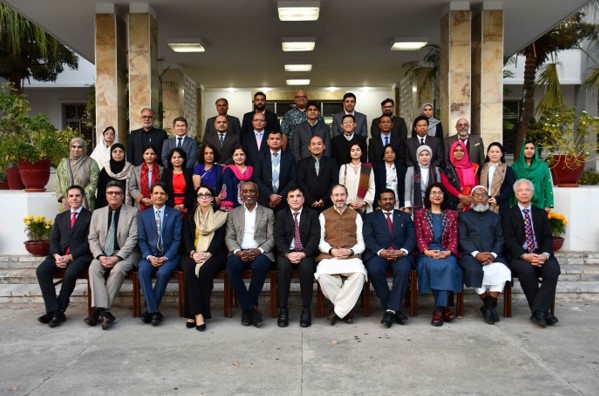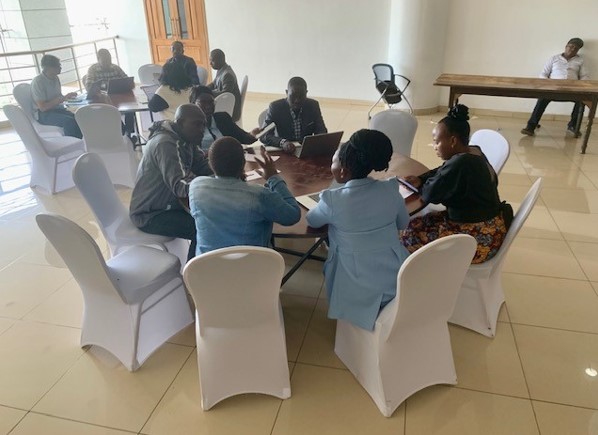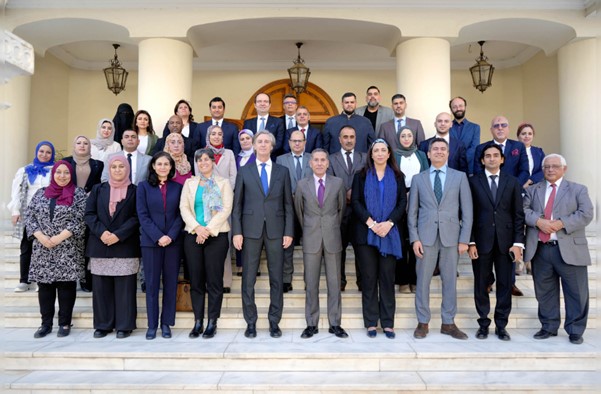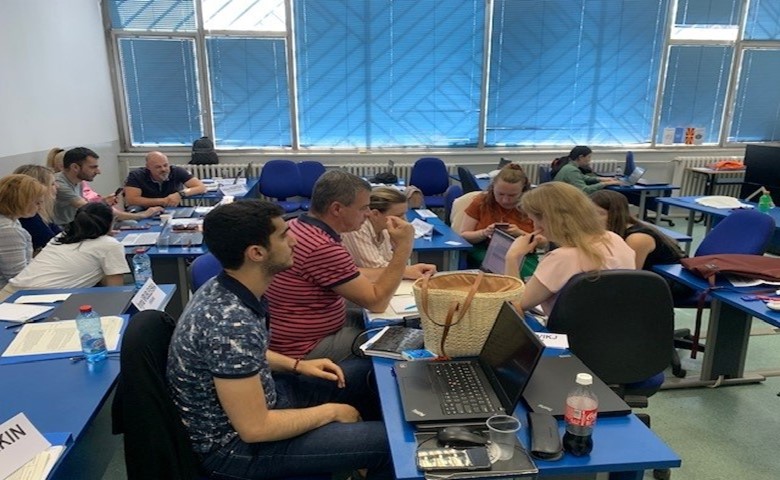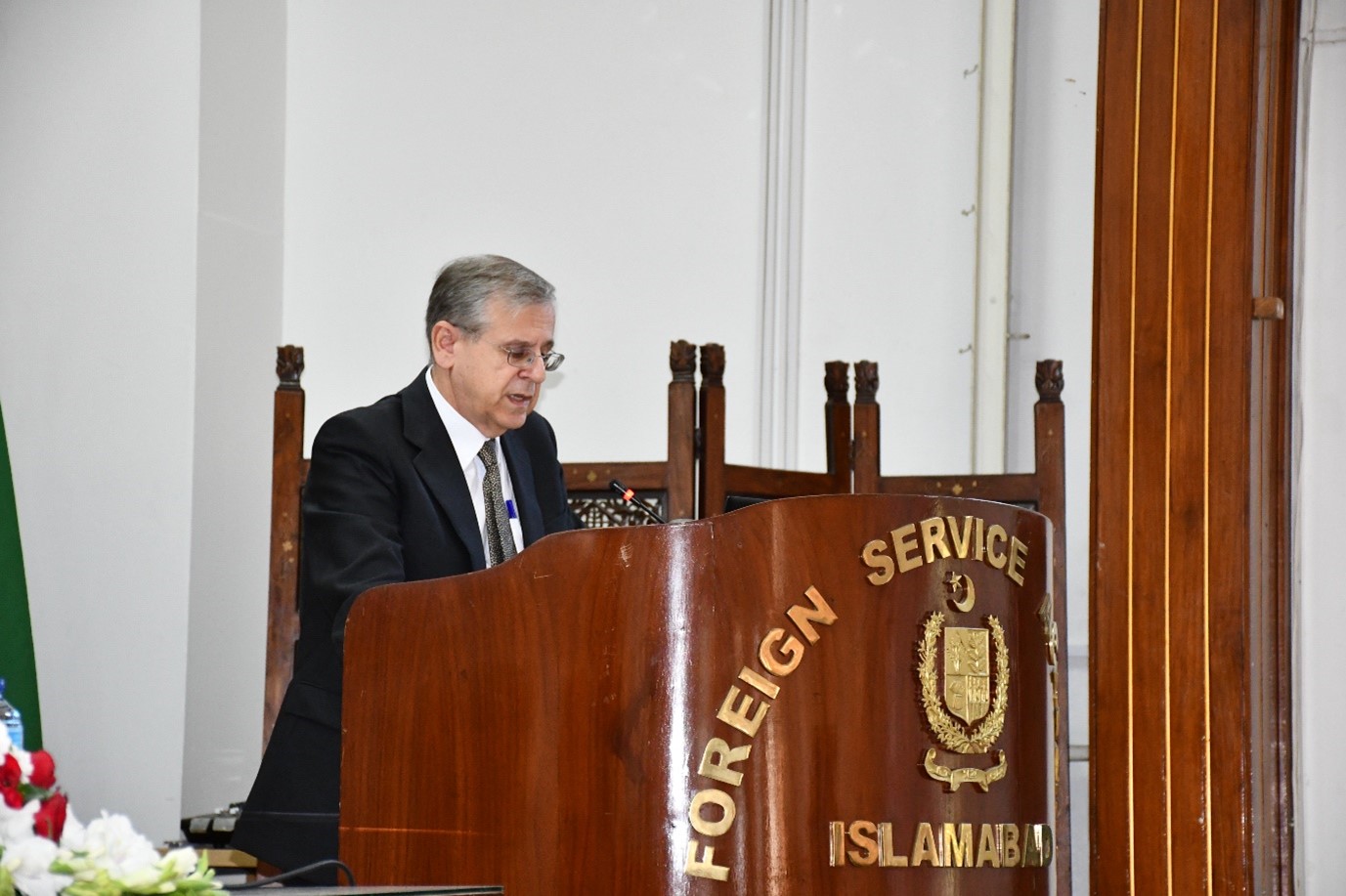| 52nd regional course, Pakistan 2024 |
| "I am lucky to have registered in this course where substance is delivered, and schedules are consistently followed." |
|
The 52nd regional course on key issues on the international economic agenda that is designed for Asia and the Pacific was hosted from 2-13 December 2024 by Foreign Service Academy at Ministry of Foreign Affairs in Pakistan. As per usual practice, we had asked participants to share their thoughts about their experience at this regional edition, particularly what struck them most in terms of curricula and impact on their professional careers. Here is what we got:
"I am a policy maker, and I also take part in trade negotiation. The knowledge gained from this course is highly valuable and will be applied to my own work as well as sharing the knowledge with my colleagues in my workplace. I appreciate this opportunity given by UNCTAD to attend. I encourage UNCTAD to continue providing this kind of opportunity, especially for policy makers from Laos, to attend future courses as they are useful and enhance knowledge on economic issues." - Ms. Souphaphone Inthaphonh, Chief Executive Officer, Ministry of Industry and Commerce - Lao P.D.R "I am lucky to have registered in this course where substance is delivered, and schedules are consistently followed. I hope this course could be attended by many policy makers to get the analytical skills and tools that are very useful dealing with many economic issues." - Mr. Mutaqin, Researcher, National Research and Innovation Agency - Indonesia
Group photo at the closing ceremony |
| 51st regional course, Kenya 2024 |
| "UNCTAD's P166 regional course has added to my knowledge and skills drafting the policies and trade negotiations." |
|
The 51st regional course on key issues on the international economic agenda that is designed for Africa was hosted from 8-20 April 2024 by University of Nairobi. As per usual practice, we had asked participants to share their thoughts about their experience at this regional edition, particularly what struck them most in terms of curricula and impact on their professional careers. Here is what we got:
"After completing the UNCTAD regional course, I was appointed as a member of the National Committee for the Implementation of the AfCFTA in the DR Congo. Thus, I actively participate in the formulation of public policies for the effective integration of the AfCFTA in my country." - Mr. Benoit Mugisho Mastaki, Head of Office, Multilateral and Regional Trade Agreements Division, Ministry of Foreign Trade - DR Congo "I get involved in drafting many policies and legislations. This training has added to my knowledge and skills drafting the policies and trade negotiations and contributed to my capability of bringing out points that contain facts during my engagements in public forums of policy formulation in nature." - Ms. Joreen Nkole Mwelwa, Principal Economist, Ministry of Commerce, Trade, and Industry - Zambia
Participants from African region are working on a group project |
| 50th regional course, Egypt 2023 |
| "This course is amazing, and I have learned a lot from it." |
|
"I shared with colleagues many experiences, including benefiting from their experiences and the experiences of their countries in the topics raised, and I was also happy to convey my country's experience in the same context. From that, we presented about the global value chains of some economic activities in Tunisia, which opened a great space for discussion and dialogue among all attendees. Thank you UNCTAD!" - Mr. Mehrez Ben Said, Head of Central Administration Department, Ministry of Economy and Planning, Tunisia.
"This course is amazing, and I have learned a lot from it. I would like to express my appreciation for UNCTAD for putting the material together and delivering the information. The course has been very fruitful, and I have gained a solid knowledge base." - Ms. Meead Khaled Mohamed Mustafa Alansari, Acting chief, International Trade Orginsations, Ministry of industry and commerce, Bahrain. "It’s a valuable opportunity to gain knowledge and insights into the international economic agenda. Regional courses like these can offer a platform for diplomats like me to exchange ideas, network, and enhance understanding of economic issues. It's great that i had the chance to participate and I find it beneficial for my role as a Palestinian diplomat." - Ms. Khuzama O.M. Hannoon, Third Secretary, Ministry of Foreign Affairs, Palestine.
Group photo of the UNCTAD P166 regional course in Egypt 2023 |
| 49th regional course, North Macedonia 2023 |
| "I think this course provides huge opportunity for public sector employees to learn a lot about different dynamics of international trade, FDI, SMEs, etc." |
|
The 49th regional course on key issues on the international economic agenda that is designed for Eastern Europe was hosted from 3 to 14 July 2023 by Saints Cyril and Methodius University of Skopje. As per usual practice, we had asked participants to share their thoughts about their experience at this regional edition, particularly what struck them most in terms of curricula and impact on their professional careers. Here is what we got:
"I think this course provides huge opportunity for public sector employees to learn a lot about different dynamics of international trade, FDI, SMEs, and etc. and later on implement their learnings in their work.” - Mr. Majid Mirzayev, Digital Economy Specialist, Centre for Analysis and Coordination of the 4th Industrial Revolution, Ministry of Economy - Azerbaijan "I believe that the course is very useful not only in terms of obtaining the necessary knowledge, but also in terms of exchanging experience with foreign colleagues, it is also a great opportunity to communicate with experts and get their professional opinion.” - Ms. Yana Vasilenka, Second Secretary, Export Promotion Division, Ministry of Foreign Affairs – Belarus
Participants are working on a group project |
| 48th regional course, Pakistan 2022 |
| "UNCTAD's 48th P166 regional course has given us more than we have expected in terms of the Economic perspectives and insights of the global economic environment." |
|
The 48th regional course on key issues on the international economic agenda that is designed for Asia and the Pacific was hosted from 21 November to 2 December 2022 by Foreign Service Academy. As per usual practice, we had asked participants to share their thoughts about their experience at this regional edition, particularly what struck them most in terms of curricula and impact on their professional careers. Here is what we got:
"This course has given us more than we have expected in terms of the Economic perspectives and insights of the global economic environment, as well as zooming in into different country experiences from which we can learn and related to the challenges we face in our country context. It was a very fruitful and beneficial learning experience which opened our minds in various different aspects of global economy, trade and development. It has also given us a great opportunity to work with very talented and experienced colleagues from other regional countries and created a platform of knowledge sharing and learning from each other. Truly, a very fruitful and memorable experience which will help in our professional and personal lives.” - Ms. Mariyam Areefa, Project Officer, Ministry of Economic Development - Maldives "P166 course for me is a very comprehensive and well-planned training course targeting the mid-level officials like us. I extremely impressed with the training model and overall conduct of the training. It's really an opportunity for getting priceless knowledge from highly qualified and diverse resource persons.” - Mr. Dorji, Senior Trade Officer, Ministry of Economic Affairs – Bhutan
Mr. Angel González Sanz, Head, TIKDB/DTL/UNCTAD is delivering the opening remarks |
| 47th regional course, Argentina 2022 |
| "This course marks a before and after for public policymakers!" |
| The 47th regional course on key issues on the international economic agenda that is designed for Latin America and the Caribbean was hosted from 27 June to 08 July 2022 by University of Buenos Aires. As per usual practice, we had asked participants to share their thoughts about their experience at this regional edition, particularly what struck them most in terms of curricula and impact on their professional careers. Here is what we got: |
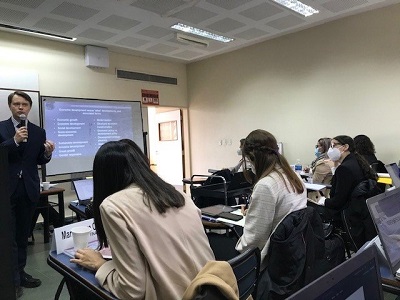 An expert is delivering a lecture "This course is of great value for the participants from different developing countries, where they have been provided the fundamental tools for the development of public policies that have an impact on the economic development of their respective countries, and as a result the participants also are replicators of this acquired knowledge, generating a kind of tipping point in its region. The extremely enriching practical and simulated exercises, which helped to consolidate and strengthen our abilities in the development of public policies and skills on negotiations, as well as the debates on current economics.” - Ms. Sofenny Diaz, Strategic Intelligence Manager, Economic Affairs Directorate - Dominican Republic "This course marks a before and after for public policymakers. It is an opportunity not only to expand knowledge but also to broaden the vision of the future of the Latin American region and the potential of governments and policymakers to make this future greener, more prosperous, and more resilient.” - Ms. Camila Murillo Flores, Advisor, Ministry of Foreign Trade - Costa Rica |
| 46th regional course, Kenya 2022 |
| "UNCTAD's 46th P166 regional course has made me realize just how much we assume we know while actually we don't." |
| The 46th regional course on key issues on the international economic agenda that is designed for Africa was hosted from 11 - 22 April 2022 by University of Nairobi. As per usual practice, we had asked participants to share their thoughts about their experience at this regional edition, particularly what struck them most in terms of curricula and impact on their professional careers. Here is what we got: |
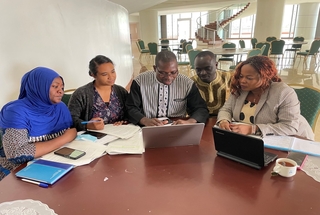 The participants are working together "UNCTAD's 46th P166 regional course has made me realize just how much we assume we know while actually we don't. The course has introduced me to various concepts and how they relate to and impact development. I have been able to learn from the diverse wealth of knowledge from the experts and, I believe I am better equipped to contribute better to policy formulation in my country now than before. I am greatful to have had the chance to participate in this wonderful course.” - Ms. Odhiambo Modester, Foreign Service Officer, Ministry of Foreign Affairs - Kenya "The training has been a wonderful platform for knowledge and practical experience sharing on investment, trade and innovation policy formulation and implementation to me.” - Mr. Alexander Kondwani Njikho, Trade Development and Facilitation Officer, Malawi Investment and Trade Centre - Malawi |
| 45th regional course, Egypt 2021 |
| "It is one of the most comprehensive learning experiences!" |
| The 45th regional course on key issues on the international economic agenda that is designed for Middle East and North Africa was hosted from 5 - 16 December 2021 by Institute for Diplomatic Studies. As per usual practice, we had asked participants to share their thoughts about their experience at this regional edition, particularly what struck them most in terms of curricula and impact on their professional careers. Here is what we got: |
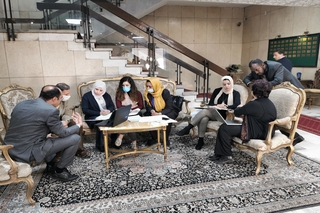 The participants are working together "It is one of the most comprehensive learning experiences. Besides peer-to-peer learning, the course provided wide knowledge on development policies of practice.” - Ms. Linda Kassem, Senior Policy and Legal Advisor, Ministry of Economy and Trade - Lebanon "P166 45th regional course in Egypt is very successful course by all standards at the level of knowledge and applications on various topics. I have benefited greatly from the information provided, especially regarding the relationship between trade and economic development.” - Mr. Mohamed Mohamed Khairy El Sayed Abdellatif, International Trade Policy Researcher, Ministry of Trade and Industry - Egypt |
| 44th regional course, North Macedonia 2021 |
| "The course presented me with a great variety of new developments in the topics of international and developmental economics." |
| The 44th regional course on key issues on the international economic agenda that is designed for Eastern Europe was hosted from 18 - 29 October 2021 by the Saints Cyril and Methodius University of Skopje. As per usual practice, we had asked participants to share their thoughts about their experience at this regional edition, particularly what struck them most in terms of curricula and impact on their professional careers. Here is what we got: |
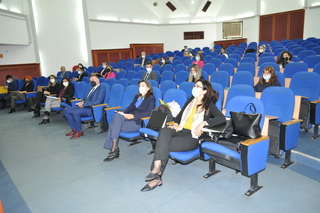 P166 Team, experts and participants "I had the privilege of participating in the 44th Regional course organized by UNCTAD in Skopje. The course presented me with a great variety of new developments in the topics of international and developmental economics. I had the opportunity to get acquainted with the best policy practices in this area. Moreover, the ideas presented in the course provided me with an avenue for the future research. Finally, the course enable me to establish numerous contacts with colleagues throughout the region. Once again, I would like to express my gratitude for this opportunity. I am certain I will make great use of the knowledge I have acquired in this course and that the contacts which I established will lead to a successful collaboration.” - Mr. Radovan Kastratović, Teaching Assistant, University of Belgrade Faculty of Economics - Serbia "Very useful course, offering opportunities to deepen my experience, knowledge, and understanding for development and development policies.” - Ms. Razmena Cekic, State Secretary, Ministry of Economy - North Macedonia |
| 43rd regional course, Singapore 2019 |
| "The knowledge learned will be used to share with other young officers to be aware of some of these issues and challenges." |
| The 43rd regional course on key issues on the international economic agenda that is designed for Aisa and the Pacific was hosted from 18 - 29 November 2019 by the Singapore Cooperation Programme. As per usual practice, we had asked participants to share their thoughts about their experience at this regional edition, particularly what struck them most in terms of curricula and impact on their professional careers. Here is what we got: |
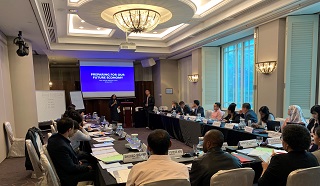 P166 Team, experts and participants "The 43rd regional course on International Economic Agenda provides excellent knowledge and skills for young professionals to better understand the concepts of trade, development, industry and on emerging issues like e-commerce, frontier technologies etc. It also provides a comprehensive understanding of the issues developing in the region and the world. This will equip young professionals like myself to keep abreast of the developments and provide meaningful policy inputs using the concepts learned. Interestingly, my country is going through a new development paradigm and the lessons learned from the course will help me provide a meaningful input in the process.” - Mr. Kuenzang Dorji, Assistant Desk Officer, Economic and Development Division, Ministry of Foreign Affairs - Bhutan |
|
"The UNCTAD P166 course was structured and the modules were presented by professionals, who have studied and worked on issues and challenges of countries across the globe. The modules presented
on issues relating to macro-economic issues, trade policy and trade facilitation are very important to a developing economy. The knowledge learned will be used to share with other young officers to be aware of some of these issues and
challenges. I thank UNCTAD for the opportunity to attend and participate in this course.” - Ms. Jacinta Somoi Warakai-Manua, Director General, Department of Foreign Affairs and International Trade - Papua New Guinea |
|
"The P166 course challenged my current thought process and understanding of key regional trade and economic development issues. The two-week programme has a bit of everything for a complete package - research, presentations, country experiences and participant exercises. It has been a privilege to be part of such an excellent training programme, but now it’s my responsibility to share this knowledge back home as its definitely going to improve the quality of work, of an agency and create better, integrated and inclusive policies that are beneficial to the government." - Mr. Shuhad Ibrahim, Consultant,
Ministry of Economic Development - Maldives |
| 42nd regional course, Medellin 2019 |
| "This P166 course is a comprehensive, enlightening and well delivered, and explores economic policy-making." |
| The 42nd regional course on key issues on the international economic agenda that is designed for Latin America and the Caribbean was hosted from 22 July to 2 August 2019 by the EAFIT University at Medellin, Colombia. As per usual practice, we had asked participants to share their thoughts about their experience at this regional edition, particularly what struck them most in terms of curricula and impact on their professional careers. Here is what we got: |
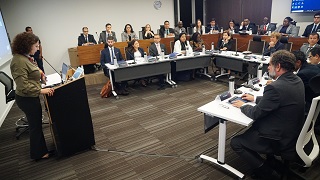 P166 Team, experts and participants "By attending the P166 42nd Regional Course, I was able to successfully update my knowledge on key issues on the international economic agenda. In our daily routine, we are often focused on specific activities and it is common to lose track of the bigger picture, such as major constraints our countries face in reaching our development goals. The P166 course offered an opportunity to solve this problem by allowing access to high-quality tools and knowledge that may be used in finding new solutions for the economic challenges my country faces.” - Mr. Joao Marcelo Conte Cornetet, Head, Division of Economic Organizations, Ministry of Foreign Affairs - Brazil |
|
"This P166 course is a comprehensive, enlightening and well delivered, and explores economic policy-making. I am leaving this course as a more knowledgeable, empowered and motivated public official. I now have a thorough understanding of the impact of all policies that I will be designing and much more cautious, to ensure that my recommendations take into account the full range of international and domestic issues.” - Mr. Lidon Lyzandel Charles, Foreign Service Officer III, Ministry of Foreign Affairs - Guyana |
|
"It has been an excellent course with high professional level. It allowed me to obtain new knowledge that I will apply to my country in accordance with current economic trends in international trade, FDI and sustainable development. " - Ms. Cinthya Rafaela Toca Sánchez, Economist,
Ministry of Foreign Trade and Investment - Cuba |
| 41st regional course, Nairobi 2019 |
| "I can say without any hesitation that the UNCTAD P166 Programme is a thought-provoking initiative to the benefit of the member States in the area of development." |
| The 41st regional course on key issues on the international economic agenda that is designed for Africa was hosted from 25 March to 5 April 2019 by University of Nairobi, Kenya. As per usual practice, we had asked participants to share their thoughts about their experience at this regional edition, particularly what struck them most in terms of curricula and impact on their professional careers. Here is what we got: |
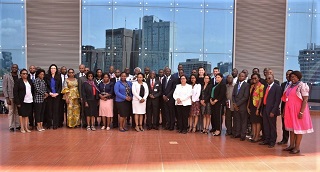 "The UNCTAD regional course was very elaborate and tailored well to suit the African situation and the practical issues of importance to the continent. It covered many issues that are a key priority to my country, the region and the international
agenda including trade, economics, development, e-commerce, transport facilitation, Foreign Direct Investment, resource mobilization among others. I also benefited from the interactive sessions that included sharing of our country
experiences.;- Ms. Christine M'kwenda, First Secretary, Ministry of Foreign Affairs - Kenya "The UNCTAD regional course was very elaborate and tailored well to suit the African situation and the practical issues of importance to the continent. It covered many issues that are a key priority to my country, the region and the international
agenda including trade, economics, development, e-commerce, transport facilitation, Foreign Direct Investment, resource mobilization among others. I also benefited from the interactive sessions that included sharing of our country
experiences.;- Ms. Christine M'kwenda, First Secretary, Ministry of Foreign Affairs - Kenya"I can say without any hesitation that the UNCTAD P166 Programme is a thought-provoking initiative to the benefit of the member States in the area of development. I believe I am absolutely justified to say that UNCTAD through this programme
is really helping the developing countries and least developed countries in their development.” - Mr. Mmaman Laminou Mahaman Balarabe, Chef, Division des Etudes et Règlementations, Direction du Commerce Extérieur, Ministère du Commerce
et de la Promotion du secteur Privé- Niger
|
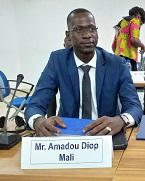 " Strengthening of the human capital is the crucial key to development. This is where the P166 Programme of UNCTAD is very useful and important-training human resources to be better deal with the socio-economic challenges in developing countries." - Mr. Amadou DIOP; Inspecteur des Services Economiques, Chef du Service Accréditation à l’Agence Malienne de Normalisation et de Promotion de la Qualité (AMANORM), Point focal du Système Ouest Africain d’Accréditation (SOAC)/West African Accreditation
System (WAAS) Focal Point, Membre du Comité Communautaire d’Évaluation de la Conformité de la CEDEAO (ECOCONF) - Mali " Strengthening of the human capital is the crucial key to development. This is where the P166 Programme of UNCTAD is very useful and important-training human resources to be better deal with the socio-economic challenges in developing countries." - Mr. Amadou DIOP; Inspecteur des Services Economiques, Chef du Service Accréditation à l’Agence Malienne de Normalisation et de Promotion de la Qualité (AMANORM), Point focal du Système Ouest Africain d’Accréditation (SOAC)/West African Accreditation
System (WAAS) Focal Point, Membre du Comité Communautaire d’Évaluation de la Conformité de la CEDEAO (ECOCONF) - Mali |
| 40th regional course, Cairo 2018 |
| "I also learned from the experiences of other countries. That will play an important role in developing trade in the various sectors of our economies." |
| The 40th regional course on key issues on the international economic agenda that is designed for Middle East and North Africa was hosted from 25 November to 6 December 2018 by the Institute for Diplomatic Studies, Ministry of Foreign Affairs Egypt. As per usual practice, we had asked participants to share their thoughts about their experience at this regional edition, particularly what struck them most in terms of curricula and impact on their professional careers. Here is what we got: |
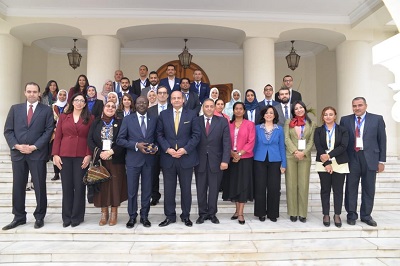 P166 Team, experts and participants "The P166 course is an excellent course I have never attended before. The topics discussed were very prominent. The organization and logistics were well done. Honestly, my participation in this course allowed me to deepen and sharpen several knowledge areas of which I had a general concept only (development and economic growth, the role of the WTO in the world economy), to update certain information (sustainable development, e-commerce, immigration and innovation) and also to enrich myself with new concepts (trade facilitation, negotiation of services and how to choose an investor). The P166 course, allowed me also to discover how the negotiations are actually done at the WTO and this, thanks to the simulation exercise on the negotiations of the services. The FDI case study helped me as well to learn more about the requirements of an investor and how the Country should meet its requirements without compromising sovereignty and the interests of its SMEs. I would add, that the components of the 3 modules were well harmonized and well sequenced. All the participants are skilled and have well represented their country. Congratulations again!” - Ms. Khadija Yazidi, Project Manager, Ministry of Industry, Investment, Trade and Digital Economy - Morocco |
|
"I have learned the right concepts of many development issues, learned policies and mechanisms to create decent jobs, reduce inequalities and best income development policies, reduce poverty, as well as the importance of policies to attract foreign direct investment” - Dr. Maghawry Shalaby Ali Shalaby Moussa, Chairman of the Economic Group, Ministry of Trade and Industry - Egypt |
|
"The overall course content was excellent. The experts were very helpful, knowledgeable and I have gained more useful information in the field of the design of national trade policies in attracting foreign direct investment that will develop the trade in our countries. I also learned from the experiences of other countries. That will play an important role in developing trade in the various sectors of our economies. " - Ms. Omalhassan Mohamed Haggar Mohamed, Assistant
Inspector, Ministry of Trade and Industry - Sudan |
| 39th regional course, Belgrade 2018 |
| "A very useful thing was to apply this knowledge immediately through the exercises." |
| The 39th regional course on key issues on the international economic agenda that is designed for Economies in Transition/Eastern Europe was hosted from 25 June to 6 July 2018 by the University of Belgrade with the support of the Ministry of Trade, Tourism and Telecommunications of Serbia. As per usual practice, we had asked participants to share their thoughts about their experience at this regional edition, particularly what struck them most in terms of curricula and impact on their professional careers. Here is what we got: |
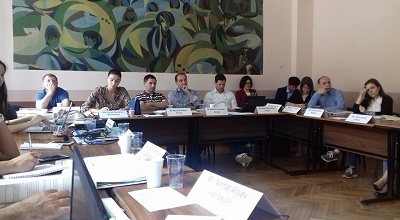 P166 Team, experts and participants "I have attended a number of similar intensive courses on different topics. I believe that by the workshops organized during the course and presentations that the participants were required to deliver, this course provided us not just with an opportunity to gain theoretical knowledge about the global economic challenges, but to (to a certain extent) connect it and analyse it in terms of the situations in our countries. Needless to say that this was also an opportunity to practice public speaking and improve our presentation skills." - Ms. Ana BANOVIĆ, Department Head, Ministry of Finance - Montenegro |
|
"During this course I consolidated my knowledge on trade related issues and I found a lot of new information which I will apply duringmy daily work. At the same time, it was a pleasure for me to learn about subjects I am not dealing with in my daily
work - as FDI, logistical and technological aspects. Therefore, it was very useful for me to get involved in these issues and to open up new fields I am already interested in. A very useful thing was to apply this knowledge immediately
through the exercises." - Ms. Anastasia CALIN, Main adviser, Ministry of Economy and Infrastructure - Moldova |
|
"The course was very well organized and presented a big opportunity for participants to enhance their knowledge on global economy, trade, industry, and linkages between multilateral, regional and local economies." - Mr. Jumni SALI, Ministry of Foreign
Affairs - FYROM |
| 38th regional course, Singapore 2017 |
| ""The best development course I ever attended." " |
| The 38th regional course on key issues on the international economic agenda that is designed for Asia and the Pacific was hosted from 13 November to 1 December 2017 by Singapore Cooperation Programme Ministry of Foreign Affairs. As per usual practice, we had asked participants to share their thoughts about their experience at this regional edition, particularly what struck them most in terms of curricula and impact on their professional careers. Here is what we got: |
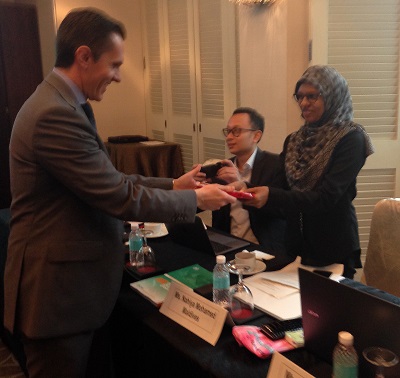 Nahiya MOHAMED |
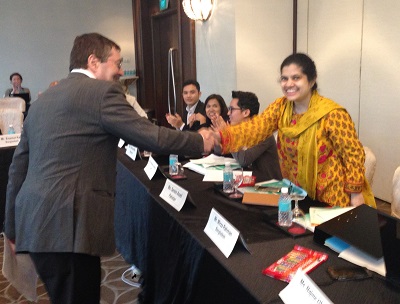 Serein ASAD |
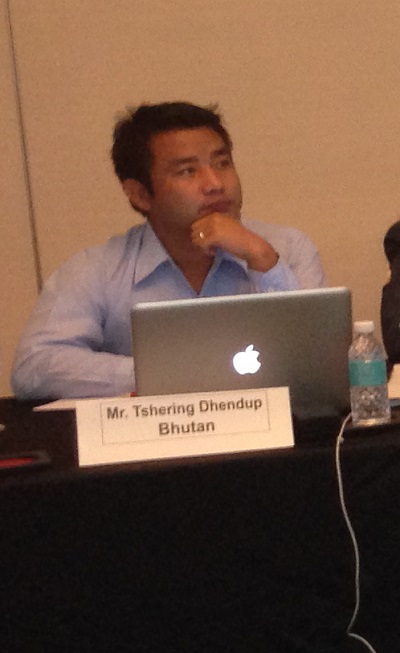 Tshering DHENDUP |
| 37th regional course, Colombia 2017 |
| "UNCTAD 37th P166 Flagship Course in Medellin 2017 has helped us to develop innovative strategies " |
| The 37th regional course on key issues on the international economic agenda that is designed for Latin America and Caribbean economies was hosted from 24 July to 11 August 2017 by EAFIT University Medellin with the support of the Colombian Ministry of Foreign Affairs. As per usual practice, we had asked participants to share their thoughts about their experience at this regional edition, particularly what struck them most in terms of curricula and impact on their professional careers. Here is what we got: |
 Omar CHEDDA |
| 36th regional course, Mauritius 2017 |
| "UNCTAD 36th P166 Flagship Course in Mauritius 2017 was well structured, rich in content and examples, coupled with statistical data and clear explanations " |
| The 36th regional course on key issues on the international economic agenda that is designed for Africa was scheduled from 13 February to 3 March 2017 with the University of Mauritius. As per usual practice, we had asked participants to share their thoughts about their experience at this regional edition, particularly what struck them most in terms of curricula and impact on their professional careers. Here is what we got: |
|
"UNCTAD 36th P166 Flagship Course in Mauritius 2017 was well structured, rich in content and examples, coupled with statistical data and clear explanations. It was indeed insightful and covers the most recent economic issues and challenges facing African
countries and the rest of the world in comparison. I can now personally confirm to have broadened my understanding of the key issues of international economic agenda discussed during the course. I am also confident that the experience
gained and lessons learnt have enhanced my ability to replicate the training at the national level, provide informed advisory services to high-level policy makers, and apply the knowledge in research and formulation of targeted development
policies." - Jesse Jefferson FAHN-Liberia, Department Coordinator, WTO Unit, Ministry of Commerce & Industry, Liberia.
|
| 35th regional course, Oman 2016 |
| "This course organized my economic knowledge about economic issues on the global level, enriched my knowledge and information about MENA region and Arab countries economic situation (past& present), and gave me a perspective from which I can draw some policy recommendations for my country. " |
| The 35th regional course on key issues on the international economic agenda that is designed for economies of the Middle East and North Africa (MENA) was hosted by the Ministry of Commerce and Industry of Oman from 9 to 27 October 2016. As per usual practice, we had asked participants to share their thoughts about their experience at this regional edition, particularly what struck them most in terms of curricula and impact on their professional careers. Here is what we got: |
|
"This course organized my economic knowledge about economic issues on the global level, enriched my knowledge and information about MENA region and Arab countries economic situation (past& present), and gave me a perspective from which I can draw
some policy recommendations for my country." - Eman Moustafa, Economic Researcher, The General Authority for Investment and Free Zones, Egypt.
"I gained knowledge on economic indicators that differentiate the developed and developing countries, and the impact of different aspects that effect our social, economic, environment development, and how all of these factors are interrelated nationally and internationally and influence our overall growth." - Zahra Al-Siyabi, Head of Accreditation Section, Ministry of Commerce and Industry, Oman. |
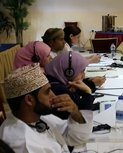 Oman Participants "This course is a high ranking course that is very interesting and able to train future policy makers like us to better understand connections and interdependence between different policies and their impact on economic growth and development, and also widen knowledge on the economic situation of countries and learn from their experience in applying trade policy." -Zeina Harakeh, Tade Specialist, Ministry of Economy and Trade, Lebanon "The Module two of the program was an opportunity to learn more about negotiation techniques as well as other technical aspects related to developing and LDC countries." -Elhossain Outougane, Civil Servent, Ministry of Foreign Trade, Morocco |
| 34th regional course, Belgrade 2016 |
| "The course improved my knowledge in the field of international trade, helping me to learn economic and development issues and understand their interdependence. " |
| The 34th regional course for Economies in Transition for policy makers and academics was held once again at the University of Belgrade, Faculty of Economics from 16 May to 03 June 2016. As per usual practice, we had asked participants to share their thoughts about their experience at this regional edition, particularly what struck them most in terms of curricula and impact on their professional careers. Here is what we got: |
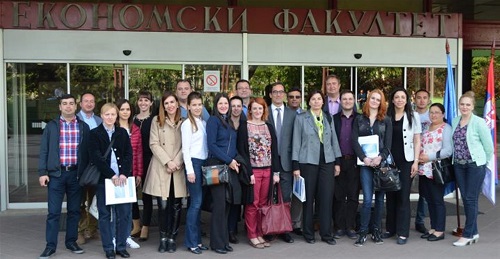
P166 Team, experts and participants "This course has helped me to better understand connections and interdependence between different policies and their impact on economic growth and development. It has also expanded my understanding of global economy." - anonymous participant "Completing P166 Regional Course on International Economic Agenda helped to improve my knowledge on key macroeconomic and development issues in today's globalized economy." - anonymous participant |
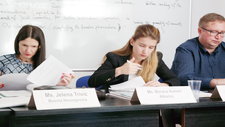
Participants at the 34th regional course "The course improved my knowledge in the field of international trade, helping me to learn economic and development issues and understand their interdependence. The course gave me new contacts and helped me to understand the regional issues of the area and the challenges faced by the transition economies in Europe." - Marti Mätas, Counsellor, EU and International Cooperation Department, Ministry of Economic Affairs and Communications, Estonia |
| 31st regional course, Mauritius 2015 |
| "The course's emphasis on the development dimension was spot-on - this is what LDCs and developing countries need to build capacities in order to meet their development goals. " |
| The 31st regional course for African policy makers and academics was held once again at the University of Mauritius from 9 to 27 February 2015. As usual, we had asked several participants to share their thoughts about their experience at this regional edition, particularly what struck them most about the curricula and how this may affect them at the professional and personal levels. |
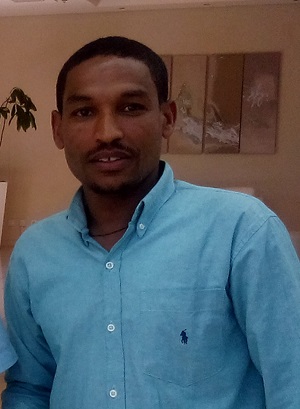
Solomon Tesfasilassie |

Shaw Chimombe |

Khady Ba |
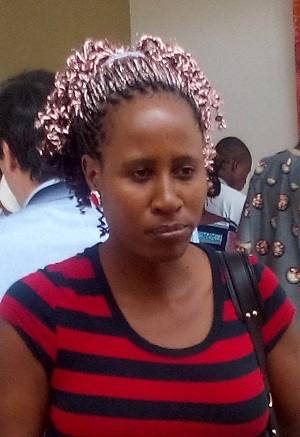
Zibanani Kahaka |
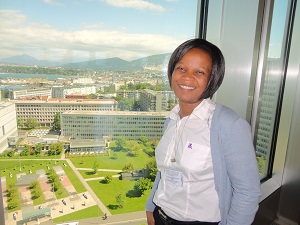
Motheba Malibeng |
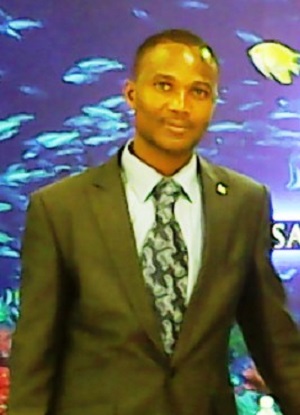
Deogratias Efavi |
| 29th regional course, Belgrade 2014 |
| "UNCTAD forward-thinking development perspective " |
| The first edition in 2014 of the paragraph 166 regional course was held in Belgrade at the Faculty of Economics in July. Many policy makers and academics from 10 countries in the region participated in this course - the 30th edition for countries with economies in transition. Four of them - Danijela, Emilia, Snjezana and Taras agreed to share their experience with us. For Emilia Cebotari, who works in the Division for Policies and Entrepreneurial Activity, Ministry of Economy of Moldova, the course helped her understand better the current global economic dynamics, especially the issues and policy challenges that countries in transition face. She also appreciated that the program highlighted the opportunities and approaches that may be chosen to enhance the economic and business environment in their respective economies. |
 Taras
Krykun agreed with Emilia as he said that the course helped him to understand better the benefits of countries building their national and regional capacities to deal with trade, environment and development issues, and in that regard,
this UNCTAD course was most useful to him. Taras is Deputy Head of the Legal Department at the Ministry of Economic Development and Trade of Ukraine. Taras
Krykun agreed with Emilia as he said that the course helped him to understand better the benefits of countries building their national and regional capacities to deal with trade, environment and development issues, and in that regard,
this UNCTAD course was most useful to him. Taras is Deputy Head of the Legal Department at the Ministry of Economic Development and Trade of Ukraine. |
 Danijela
Gacevic who is Senior Advisor in the Department for Multilateral Trade Cooperation, Ministry of Economy in Montenegro confirmed what her course colleagues said. For her, even though she had been working in multilateral and regional trade
cooperation and undertaken many training programs for several years, this regional course by UNCTAD was very valuable as it confirmed the important role of trade policy in development, and its relationship with other trade instruments
and measures. Danijela
Gacevic who is Senior Advisor in the Department for Multilateral Trade Cooperation, Ministry of Economy in Montenegro confirmed what her course colleagues said. For her, even though she had been working in multilateral and regional trade
cooperation and undertaken many training programs for several years, this regional course by UNCTAD was very valuable as it confirmed the important role of trade policy in development, and its relationship with other trade instruments
and measures. |
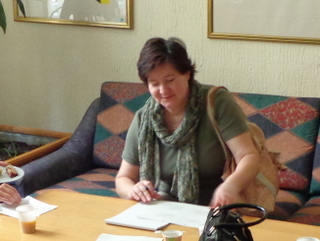 For
Snjezana Brkic, Assistant Professor at the School of Economics and Business, University of Sarajevo, the course was the best that she had ever attended of its kind. For Snjezana, the focus on international trade, investment, finance and
innovation was not entirely new as she teaches these issues. However, the clever and interesting manner in which these issues were linked to each other within the larger framework of sustainable development, were new and refreshing to
her. The inspiration for this larger framework, Snjezana felt, was in part due to the heterogeneous make-up of the group, but more importantly, because the curricula struck the right balance between theory, policy and practice. This balance
is attributed to the relevant case studies and organized simulations of decision making processes on economic policy development and the applicability of certain policies. Certainly, the challenge of creating a cohesive course from the
diversity of contexts, topics, and perspective ultimately testifies to the competence of the experts and course organizers. For
Snjezana Brkic, Assistant Professor at the School of Economics and Business, University of Sarajevo, the course was the best that she had ever attended of its kind. For Snjezana, the focus on international trade, investment, finance and
innovation was not entirely new as she teaches these issues. However, the clever and interesting manner in which these issues were linked to each other within the larger framework of sustainable development, were new and refreshing to
her. The inspiration for this larger framework, Snjezana felt, was in part due to the heterogeneous make-up of the group, but more importantly, because the curricula struck the right balance between theory, policy and practice. This balance
is attributed to the relevant case studies and organized simulations of decision making processes on economic policy development and the applicability of certain policies. Certainly, the challenge of creating a cohesive course from the
diversity of contexts, topics, and perspective ultimately testifies to the competence of the experts and course organizers. |
| Danijela agreed with Snjezana that the structure of the course was very useful as it took them from broad macroeconomic issues to specific topics on investment, science, technology and innovation and trade logistics and trade. What really impressed Danijela was that this structure gave them a better understanding of the linkages between these different measures at the horizontal level, as well as the importance of SMEs, global value chains and their relationships to transnational corporations. She acquired very useful analytical tools to assess the impact of trade agreements while keeping in mind that the most valuable and underlying vision must be one that is targeted at development as the starting point for any national action. Danijela added, "while I understand that economic integration is necessary, I now know better that this must always be tied to the real benefits gained for the country." Taras echoed these views as he said that the experience he gained in examining the linkages amongst trade, investment, technology, finance and development only confirmed in his mind that these important drivers must be considered in trying to bring about certain development changes. |
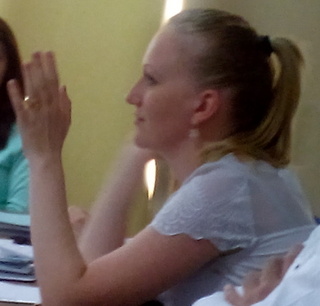 Emilia
added that several aspects of the course, topics covered on SME and FDI issues, were of particular interest to her, they are an integral part of her professional work. Specifically, the course helped her identify the important
links between foreign investment, domestic enterprises and international production systems. A strong point of the course was the way it illustrated the value chain and its integration into global production networks. For Emilia, the course
highlighted the need to develop local supply capacities as a way of benefiting from global trade opportunities. Finally, the course helped her grasp the importance of the regulatory environment: the institutional and physical trade infrastructures
in fostering international trade competitiveness through the development of productive and trading capacities within national economies. Emilia
added that several aspects of the course, topics covered on SME and FDI issues, were of particular interest to her, they are an integral part of her professional work. Specifically, the course helped her identify the important
links between foreign investment, domestic enterprises and international production systems. A strong point of the course was the way it illustrated the value chain and its integration into global production networks. For Emilia, the course
highlighted the need to develop local supply capacities as a way of benefiting from global trade opportunities. Finally, the course helped her grasp the importance of the regulatory environment: the institutional and physical trade infrastructures
in fostering international trade competitiveness through the development of productive and trading capacities within national economies. |
| All of them also appreciated the opportunity to learn from the lessons and experiences of other countries. Danijela for instance appreciated that the policy development exercises were based on real-life situations. The exercises encouraged participants to think further and pushed them to be more creative in their expectations of policymakers and of policy development. The exercises were detailed, comprehensive and required lots of preparations and were a great opportunity for further discussions amongst the groups. Here, she echoed what Snjezana felt that the mix of course participants enhanced and deepened the debate sessions and the understanding of the current problems at hand in their respective economies. The exercises revealed how challenging it was to make decisions, especially when the interests of all stakeholders had to be taken into account to achieve development and other goals. She particularly liked the exercise on the GATS and services negotiations which was designed to use knowledge gained during the entire course and which encouraged them to think outside of the box. Emilia could not agree more, the GATS exercise helped her better understand the relationship between Moldova's national policy priorities and the schedule of commitments when liberalizing sectors at multilateral or bilateral agreements. For Snjezana, it was clear that the successful and challenging stories were equally useful. In fact, the discussions concerning failed policies were crucial for her learning process. The course was, at the same time, challenging and motivating, it demanded participation in the debates, exercises and other activities. The discussions among participants and lecturers were captivating and persistent; continuing even through coffee breaks or lunch. |
| All four of our contributors paid tribute to the UNCTAD experts who encouraged them to think creatively and openly. The experts stressed that participants voice their individual opinions and ideas but come together as a team for final decision making. The highly-skilled experts stimulated the members to think beyond the ideas in the presentations. Danijela calls this demand to "think outside the box" a distinguishing factor of the regional course, and a major achievement. For Taras, the experts created an unforgettable and friendly atmosphere that turned the education process into a fun, fascinating and light experience. Snjezana agrees that the construction of the contents, topics and perspectives were a smooth mix, which testifies to the competence and expertize of the UNCTAD colleagues. She truly appreciated that some of the "old" debates on the effects of trade, investment and financial liberalization were distinguished from the "new" points of view. She describes these new points of view as the "UNCTAD forward-thinking development perspective". Finally, for Snjezana, the atmosphere of learning, thinking, acting, cooperating, and sharing that was both challenging yet inviting and inclusive, made the so-called "spirit of UNCTAD" most real for her. |
| The course was held at the Faculty of Economics, University of Belgrade, which is now a multi-year venue for regional courses from 2014 to 2018. |
| 28th regional course, Singapore 2013 |
| "This UNCTAD course is an eye-opener on development" |
| Vinit Lal and Saybandith Sayavongkhamdy both were selected to attend the 28th regional course for the Asia-Pacific region that was held in collaboration with the Singapore Cooperation Program of the Ministry of Foreign Affairs in November 2013. For Saybandith, who is Deputy Director, Multilateral Trade Policy Division, Foreign Trade Policy Department, Ministry of Industry and Commerce of Lao PDR, trade liberalization has been the most important issue at his work, and after having attended the 28th Regional Course he said that "it opened up my horizontal thinking, the course provided me with broader aspects of national development. It introduced other aspects of development such as macroeconomics, finance, investment and innovation. When I look back at the efforts made in my country, I began to realize that these are targeted at opening up the economy to attract FDI, TNCs, liberalize trade facilitation; but I realized that efforts must be targeted to also understand how to really benefit from such liberalization; how can we prepare the private sector in this process, including, especially the SMEs? Which part of the value chain should we target to bring development benefits to my country?" |
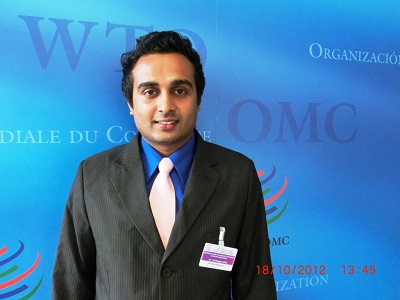 Vinit
Lal, who is Economic Planning Officer, Macroeconomic Policy and Planning Division at the Ministry of Strategic Planning, National Development and Statistics of Fiji, agreed with Saybandith. "As a policy maker this course is very important
for me as it highlights the linkages and spillover effects of any policy decision on the various sectors of the economy. It is perfectly structured, and indeed an eye-opener for policy makers on the development perspective of the Asia-Pacific
region. It highlights the underlying reasons on the dynamic transformation that each economy is going through." Vinit
Lal, who is Economic Planning Officer, Macroeconomic Policy and Planning Division at the Ministry of Strategic Planning, National Development and Statistics of Fiji, agreed with Saybandith. "As a policy maker this course is very important
for me as it highlights the linkages and spillover effects of any policy decision on the various sectors of the economy. It is perfectly structured, and indeed an eye-opener for policy makers on the development perspective of the Asia-Pacific
region. It highlights the underlying reasons on the dynamic transformation that each economy is going through." |
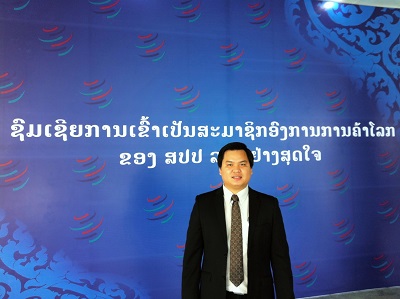 Saybandith
went on to emphasize Lal's point: "One of the key messages of the course was policy coherence that was emphasized during both lectures and the simulation exercises. This I found very enriching. During the simulation exercise on Services
negotiations I was assigned as the "Minister of Trade and Foreign Affairs of Sumeria", and had to lead the preparation process and negotiate the "country's" position on financial services. I had to undertake internal consultations with
other stakeholders. My experiences and skills as part of the Lao PDR WTO accession team came in very useful and this was very important. I enjoyed the process and learnt many new and valuable lessons which will boost my confidence as a
trade negotiator for Lao PDR. This exercise has well prepared me for taking any lead on the Services negotiations in the future. This alone I feel will be a great contribution to Services negotiations including with our ASEAN plus dialogue
partners". Saybandith
went on to emphasize Lal's point: "One of the key messages of the course was policy coherence that was emphasized during both lectures and the simulation exercises. This I found very enriching. During the simulation exercise on Services
negotiations I was assigned as the "Minister of Trade and Foreign Affairs of Sumeria", and had to lead the preparation process and negotiate the "country's" position on financial services. I had to undertake internal consultations with
other stakeholders. My experiences and skills as part of the Lao PDR WTO accession team came in very useful and this was very important. I enjoyed the process and learnt many new and valuable lessons which will boost my confidence as a
trade negotiator for Lao PDR. This exercise has well prepared me for taking any lead on the Services negotiations in the future. This alone I feel will be a great contribution to Services negotiations including with our ASEAN plus dialogue
partners".
|
| Lal praises went further: "This course is highly resourceful as it encapsulates the relationship among investment, finance, technology, trade and development. I have brought back with me so many recommendations for consideration since the country presentations given on Singapore could be partially replicated into Fiji's development agenda." Saybandith complimented this as he found the experiences of Singaporean's development strategy particularly useful. "It sets the best example as it was very successful in harnessing Science, Technology and Innovation (STI) for their national development. The Singapore Government invested heavily in developing its education system in order to support the growing specific industries within the country to obtain the right skills and talents to feed their competitive edge at the global level. The big question for me is how can Lao PDR do the same as what the Singaporeans did? Well, I feel that we are now very much behind and we have to improve very quickly as the ASEAN Economic Community is approaching in the year 2015 where goods and services will move freely within ASEAN members." |
| We asked Lal and Saybandith if there were specific examples of where they will incorporate the lessons learnt from the course. For Saybandith, the sessions on the development of the Doha Round negotiations were very important. "The up to date information and the status of the DDA negotiations will be most useful for me to provide inputs into a series of speeches and positions for my Minister to attend the 9th WTO Ministerial Conference and how we can best benefit from the Bali package as an LDC member, especially on the Trade Facilitation Agreement." Lal indicated that "after my successful attendance at this course, I have been tasked to prepare a 'Trade & Investment' paper. For Trade, my focus will be on how best Fiji can work towards deepening and broadening its integration with regional economies such as ASEAN, TPP and APEC; and on the Investment front, how best to maximize attracting FDI (since domestic investment has been one of the key drivers in the absence of the former) and how Fiji can partake as a regular player in the global production chain. I will put to effective use what I have learnt from the course". |
| Lal also offered some final comments: "Opportunities to attend such high level training complement the capacity building initiatives for Pacific Islanders as I believe that networking is a very important feature that enables the sharing of ideas and thoughts on countries' development processes. This course has given me so much important and relevant knowledge that will now assist me in formulating effective policies. I highly recommend this course to my fellow policy makers in the region since the course is thematically and holistically designed in disseminating vital information from UNCTAD's pool of experts". |
| This regional course was held for a second time in collaboration with the Singapore Cooperation Program of the Ministry of Foreign Affairs. The inaugural edition was held in November 2011 for policy makers and academics from the Asia-Pacific region. |
| P166 knowledge in practice |
| "This UNCTAD course, when put to effective use, can ultimately create positive developmental changes" |
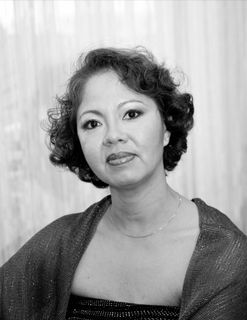 Julie
David applied and was selected to attend the UNCTAD 26th regional course for Latin America and the Caribbean in February 2013. The course was held at EAFIT University in Medellin, Colombia. After attending the course, Julie, who is Senior
Policy Specialist at the National Institute for Higher Education, Research, Science and Technology in Trinidad and Tobago, was asked to prepare an effective national science and technology policy. She confided that she felt the task was
mammoth but that, "the UNCTAD p166 program is really an important workshop. In hindsight, 6 or 7 months after the end of the course, I would not have lead the team of analysts in preparing the policy without the knowledge I gained at the
regional course in Medellin. The course not only introduced but confirmed in my mind the important variables that must be considered in trying to effect certain developmental changes in the areas of science and technology. I used the information
to understand the current situation here at home and abroad and thereafter, built a national policy of relevance to Trinbagonian society. Indeed the knowledge shared by UNCTAD in this flagship workshop is a gift - a gift which when put
to effective use can ultimately create positive developmental changes targeting those for whom specific changes are intended." Julie
David applied and was selected to attend the UNCTAD 26th regional course for Latin America and the Caribbean in February 2013. The course was held at EAFIT University in Medellin, Colombia. After attending the course, Julie, who is Senior
Policy Specialist at the National Institute for Higher Education, Research, Science and Technology in Trinidad and Tobago, was asked to prepare an effective national science and technology policy. She confided that she felt the task was
mammoth but that, "the UNCTAD p166 program is really an important workshop. In hindsight, 6 or 7 months after the end of the course, I would not have lead the team of analysts in preparing the policy without the knowledge I gained at the
regional course in Medellin. The course not only introduced but confirmed in my mind the important variables that must be considered in trying to effect certain developmental changes in the areas of science and technology. I used the information
to understand the current situation here at home and abroad and thereafter, built a national policy of relevance to Trinbagonian society. Indeed the knowledge shared by UNCTAD in this flagship workshop is a gift - a gift which when put
to effective use can ultimately create positive developmental changes targeting those for whom specific changes are intended."Julie told us later that the draft national policy was approved before the NIHERST Board of Governors after some minor adjustment. It will be taken to the Cabinet for its approval by the Minister for Science and Technology. |
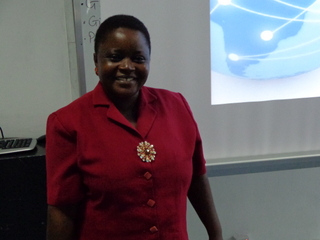 Prisca
Mbaga is Senior Trade Officer, International Trade Department, Multilateral Section of the Ministry of Industry and Trade of Tanzania Shewas also selected and she attended the 27th edition of the course for Africa at the University of
Mauritius in July 2013. After the program in Mauritius she participated in very tough trade negotiations amongst 26 African countries that represented the COMESA-SADC-EAC Tripartite Free Trade Negotiations. Prisca had to ensure that development
was incorporated into the industrial, market access and infrastructure pillars of the text. She told us that she understood the relevance of the course as, "what I realized is the missing link, the relationship, or that the lack of coordination
(to achieve market access, develop the industrial and infrastructure pillars) during the negotiations and the need to consider development issues as we had learned in module 1 in Mauritius. I am now seeing the relevance of the Mauritius
course as I negotiate! Frankly, the whole structure of the course was wonderful, as we learned and shared a lot from the multiplicity of experts, the macroeconomics issues related to development and growth and the complementarity of these
to my trade expertise made me able to establish the relationship among various economic and trade issues." Prisca
Mbaga is Senior Trade Officer, International Trade Department, Multilateral Section of the Ministry of Industry and Trade of Tanzania Shewas also selected and she attended the 27th edition of the course for Africa at the University of
Mauritius in July 2013. After the program in Mauritius she participated in very tough trade negotiations amongst 26 African countries that represented the COMESA-SADC-EAC Tripartite Free Trade Negotiations. Prisca had to ensure that development
was incorporated into the industrial, market access and infrastructure pillars of the text. She told us that she understood the relevance of the course as, "what I realized is the missing link, the relationship, or that the lack of coordination
(to achieve market access, develop the industrial and infrastructure pillars) during the negotiations and the need to consider development issues as we had learned in module 1 in Mauritius. I am now seeing the relevance of the Mauritius
course as I negotiate! Frankly, the whole structure of the course was wonderful, as we learned and shared a lot from the multiplicity of experts, the macroeconomics issues related to development and growth and the complementarity of these
to my trade expertise made me able to establish the relationship among various economic and trade issues." |
| 26th regional course, Medellin, Colombia 2013 |
| "The course is like a gift that keeps on giving" |
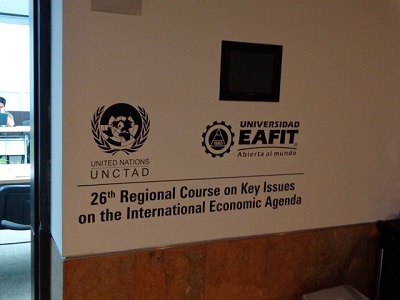 Many
policy makers from several Latin American-Caribbean (LAC) states participated in the 26th regional course, hosted by the EAFIT University, in the city of Medellin, Colombia, for the third consecutive time, in February 2013. Six of them
agreed to talk about their experiences at this course. Pamela Torres, member of the Coordination for International Strategic Insertion team at SENPLADES in Ecuador said that she was pleased to have participated at the course because of
the lengthy discussions she had with other participants and UNCTAD experts on development strategies in the various LAC countries; she also raised issues on the various programs taking place in Ecuador as a result of the implementation
of the National Development Plan. Marc Ramsay, Crown Counsel at the International Legal Affairs Section, Belize indicated that as he was intricately involved in all trade related issues, it was imperative for him to gain additional knowledge
and experience from a trade policy perspective. This was to gain insight into the economic considerations facing the region. The opportunity to attend this course, to him, was timely. Many
policy makers from several Latin American-Caribbean (LAC) states participated in the 26th regional course, hosted by the EAFIT University, in the city of Medellin, Colombia, for the third consecutive time, in February 2013. Six of them
agreed to talk about their experiences at this course. Pamela Torres, member of the Coordination for International Strategic Insertion team at SENPLADES in Ecuador said that she was pleased to have participated at the course because of
the lengthy discussions she had with other participants and UNCTAD experts on development strategies in the various LAC countries; she also raised issues on the various programs taking place in Ecuador as a result of the implementation
of the National Development Plan. Marc Ramsay, Crown Counsel at the International Legal Affairs Section, Belize indicated that as he was intricately involved in all trade related issues, it was imperative for him to gain additional knowledge
and experience from a trade policy perspective. This was to gain insight into the economic considerations facing the region. The opportunity to attend this course, to him, was timely. |
| For Karina Manon Taveras, Ministry of the Vice-Ministry for Economic and Trade Negotiations at the Ministry of Foreign Affairs, Dominican Republic , the course gave her an opportunity to step away of her everyday view of the economic situation in Dominican Republic and to be able to appreciate the wider context in which the goals and challenges of the development process are involved - in order to touch base with new tools to analyze this context and to consider her country's approach to a sustained development path. |
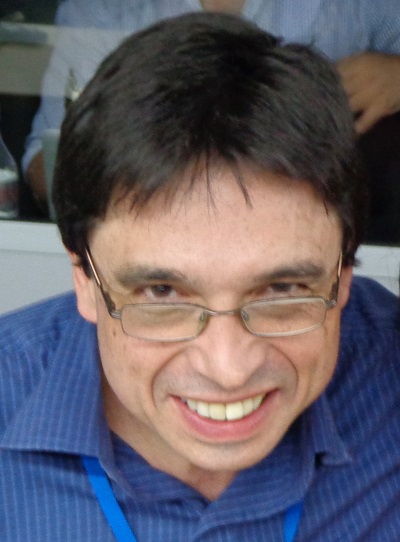 Henrique
de Azevedo Avila, Foreign Trade Division at the Brazilian Development Bank felt that the course was comprehensive in covering many contemporary economic issues in developing countries with very interesting case studies that engaged
all course participants in the learning process. For Vivian Campos, Negotiator at the Ministry of Foreign Trade in Costa Rica, the course made her explore further Costa Rica's policies on innovation and trade facilitation to better evaluate
the achievements and challenges of her country. Finally, Ayon Cruickshank, Director of International Trade Relations at the Ministry of Finance and Planning in Jamaica said, "the course materials covered extensively issues of macroeconomic
policies and development issues, foreign direct investment, international transportation and trade Facilitation, regional and multilateral trading systems and agreements as well as science, technology and innovation policies. More importantly,
the challenges affecting the various topics were underscored with relevant examples where applicable, from both developing and developed countries, and appropriate policy measure Henrique
de Azevedo Avila, Foreign Trade Division at the Brazilian Development Bank felt that the course was comprehensive in covering many contemporary economic issues in developing countries with very interesting case studies that engaged
all course participants in the learning process. For Vivian Campos, Negotiator at the Ministry of Foreign Trade in Costa Rica, the course made her explore further Costa Rica's policies on innovation and trade facilitation to better evaluate
the achievements and challenges of her country. Finally, Ayon Cruickshank, Director of International Trade Relations at the Ministry of Finance and Planning in Jamaica said, "the course materials covered extensively issues of macroeconomic
policies and development issues, foreign direct investment, international transportation and trade Facilitation, regional and multilateral trading systems and agreements as well as science, technology and innovation policies. More importantly,
the challenges affecting the various topics were underscored with relevant examples where applicable, from both developing and developed countries, and appropriate policy measures were outlined". |
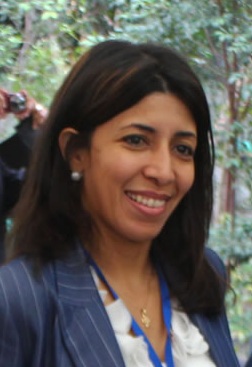 Karina
further added that the experience was especially useful for her work as she was involved in continuous international negotiations and felt that she was already getting into gear with the knowledge gained at the course. Pamela also said,
"The course provided a broad overview of the interests and experiences of other LAC countries, as well as the functioning of economic integration processes in the region. All the topics were analyzed from a development perspective, which
is the one of the most useful tools that I would apply in my professional duties. After the course for example, I was able to have a closer approach of the progress of MERCOSUR and how it´s trade structure and composition could affect
Ecuador's performance and economic activity". For Marc, "The relevant challenges were clearly identified in various aspects of the economy, from attracting FDI to debt management through to transportation policy to the processes for identifying
and applying solutions. We were also exposed to ample real world success stories, and through extensive networking we were able to share our experiences and develop useful contacts. I was impressed that the facilitators welcomed our participation
and appeared committed to helping us understand what they taught, which assisted in clearly identifying how the knowledge will be applied in our functions. I benefitted immensely from this and in the group presentations and GATS negotiations,
which required extensive preparations and collaboration and gave me first hand policy experience". Karina
further added that the experience was especially useful for her work as she was involved in continuous international negotiations and felt that she was already getting into gear with the knowledge gained at the course. Pamela also said,
"The course provided a broad overview of the interests and experiences of other LAC countries, as well as the functioning of economic integration processes in the region. All the topics were analyzed from a development perspective, which
is the one of the most useful tools that I would apply in my professional duties. After the course for example, I was able to have a closer approach of the progress of MERCOSUR and how it´s trade structure and composition could affect
Ecuador's performance and economic activity". For Marc, "The relevant challenges were clearly identified in various aspects of the economy, from attracting FDI to debt management through to transportation policy to the processes for identifying
and applying solutions. We were also exposed to ample real world success stories, and through extensive networking we were able to share our experiences and develop useful contacts. I was impressed that the facilitators welcomed our participation
and appeared committed to helping us understand what they taught, which assisted in clearly identifying how the knowledge will be applied in our functions. I benefitted immensely from this and in the group presentations and GATS negotiations,
which required extensive preparations and collaboration and gave me first hand policy experience". |
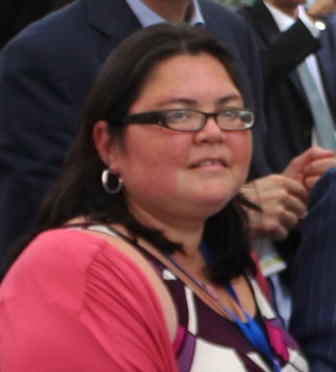 Both
Vivian and Henrique felt the same. Vivian said "the simulations and exercises were deeply important because they allowed interaction with representatives of other countries to agree to joint positions under different assumptions and realities
in trade and investment negotiations. For example, the definition of a position on services for the liberalization of trade in such a sensitive sector such as financial services expanded our knowledge and gave me additional negotiations
and analytical tools". For Henrique the experience of exchange amongst the participants was very helpful to encourage debate on different public policies and to provoke critical thinking amongst them. He said, "The course certainly will
help in my job, particularly in trade finance programs formulation and implementation aiming at promoting social and economic development in Brazil”. For Ayon, "it was most informative and engaging. An important lesson was emphasized during
the course - that teamwork is a far superior relative to individualism. It demonstrated that an entity operating independently will move faster towards its objective but effective teamwork will undoubtedly push the entities further. This
point was instrumental in fully capturing the relevance and nature of the course. With increased globalization in the current era and trade interaction among economies intensifying, countries must be cognizant of the opportunities and
threats which will accompany trade relations. The course sensitized LAC countries of the relevance of trade and the inherent externalities which follow while outlining the most effective policies that could be undertaken to realize the
full potential of globalization". Pamela also added, " I could also say that one of the main contributions was to understand the importance of preserving policy space to implement our own strategies in terms of own development needs. In
the case of trade negotiations, this is a relevant issue". Both
Vivian and Henrique felt the same. Vivian said "the simulations and exercises were deeply important because they allowed interaction with representatives of other countries to agree to joint positions under different assumptions and realities
in trade and investment negotiations. For example, the definition of a position on services for the liberalization of trade in such a sensitive sector such as financial services expanded our knowledge and gave me additional negotiations
and analytical tools". For Henrique the experience of exchange amongst the participants was very helpful to encourage debate on different public policies and to provoke critical thinking amongst them. He said, "The course certainly will
help in my job, particularly in trade finance programs formulation and implementation aiming at promoting social and economic development in Brazil”. For Ayon, "it was most informative and engaging. An important lesson was emphasized during
the course - that teamwork is a far superior relative to individualism. It demonstrated that an entity operating independently will move faster towards its objective but effective teamwork will undoubtedly push the entities further. This
point was instrumental in fully capturing the relevance and nature of the course. With increased globalization in the current era and trade interaction among economies intensifying, countries must be cognizant of the opportunities and
threats which will accompany trade relations. The course sensitized LAC countries of the relevance of trade and the inherent externalities which follow while outlining the most effective policies that could be undertaken to realize the
full potential of globalization". Pamela also added, " I could also say that one of the main contributions was to understand the importance of preserving policy space to implement our own strategies in terms of own development needs. In
the case of trade negotiations, this is a relevant issue". |
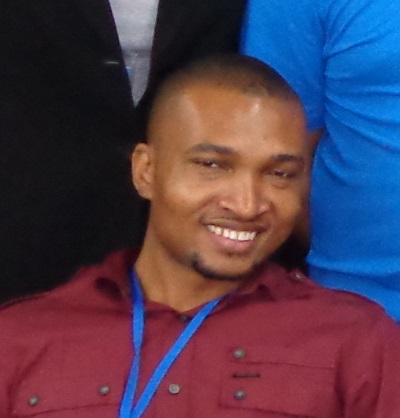 All
of them thanked UNCTAD and the experts for their continued service in assisting developing countries. Vivian was appreciative that "UNCTAD experts took time and effort to gather and organize the course content and information". Marc said,
"Thank you for the opportunity to participate in the course and the continued service in assisting developing countries". Karina added that, "This course a must for every professional involved in international trade negotiations and/or
policy makers. I thank the UNCTAD for the incredible effort and support dedicated to this cause, since all of us - the participants - have grown in these three weeks as better and comprehensive professionals and special contributors for
the development of our countries". Pamela thanked the experts from UNCTAD for this course. "I highly recommend other government officials to attend this course, not only for the academic richness and the high quality ground of the UNCTAD
experts, but also for being a great opportunity to exchange experiences and ideas with participants of the whole region and getting to know each country´s interests and reforms towards higher levels of development and social responsibility,"
she added. Ayon was appreciative that apart from the excellent organization, the course itself was useful in imparting the invaluable experience it had to offer and arm developing countries with the knowledge to mitigate the challenges
which accompany globalization while instituting policies to fully maximize development gains". All of them also thanked EAFIT for producing a conducive and friendly environment for this learning opportunity and for the generous hospitality
that the Business School provided during the course. All
of them thanked UNCTAD and the experts for their continued service in assisting developing countries. Vivian was appreciative that "UNCTAD experts took time and effort to gather and organize the course content and information". Marc said,
"Thank you for the opportunity to participate in the course and the continued service in assisting developing countries". Karina added that, "This course a must for every professional involved in international trade negotiations and/or
policy makers. I thank the UNCTAD for the incredible effort and support dedicated to this cause, since all of us - the participants - have grown in these three weeks as better and comprehensive professionals and special contributors for
the development of our countries". Pamela thanked the experts from UNCTAD for this course. "I highly recommend other government officials to attend this course, not only for the academic richness and the high quality ground of the UNCTAD
experts, but also for being a great opportunity to exchange experiences and ideas with participants of the whole region and getting to know each country´s interests and reforms towards higher levels of development and social responsibility,"
she added. Ayon was appreciative that apart from the excellent organization, the course itself was useful in imparting the invaluable experience it had to offer and arm developing countries with the knowledge to mitigate the challenges
which accompany globalization while instituting policies to fully maximize development gains". All of them also thanked EAFIT for producing a conducive and friendly environment for this learning opportunity and for the generous hospitality
that the Business School provided during the course. |
 Marc finally added one sentence, after
returning to Belize and attending a regional trade negotiation - "the course is like a gift that keeps on giving - I was able to apply some of the knowledge at a recent treaty negotiation session - thanks again!" Marc finally added one sentence, after
returning to Belize and attending a regional trade negotiation - "the course is like a gift that keeps on giving - I was able to apply some of the knowledge at a recent treaty negotiation session - thanks again!" |
| 23rd regional course, Singapore 2011 |
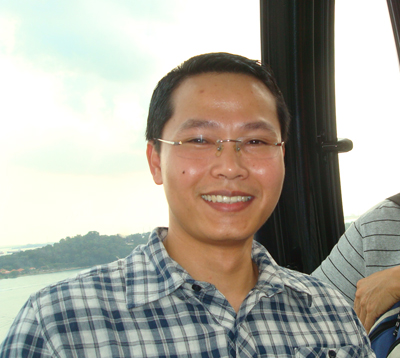 Ken
Chanmeta from the Ministry of Commerce in Cambodia attended the 23rd edition of the regional course on Key Issues on the International Economic Agenda held in Singapore. Ken said that "I felt that the course was pragmatic as it offered
both theoretical and practical aspects in understanding development". Ken
Chanmeta from the Ministry of Commerce in Cambodia attended the 23rd edition of the regional course on Key Issues on the International Economic Agenda held in Singapore. Ken said that "I felt that the course was pragmatic as it offered
both theoretical and practical aspects in understanding development". |
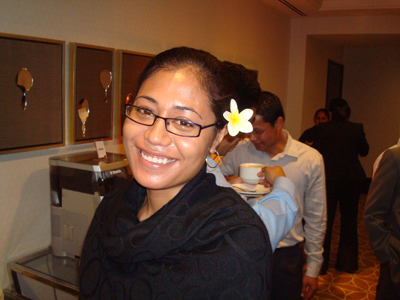 Anna
Main, Foreign Service Officer from Samoa also added," we were brought up to date on the developments of the trade, investment, development and other sectors in the world, learned from the experiences of other countries and also how to
apply the knowledge gained". Anna
Main, Foreign Service Officer from Samoa also added," we were brought up to date on the developments of the trade, investment, development and other sectors in the world, learned from the experiences of other countries and also how to
apply the knowledge gained". |
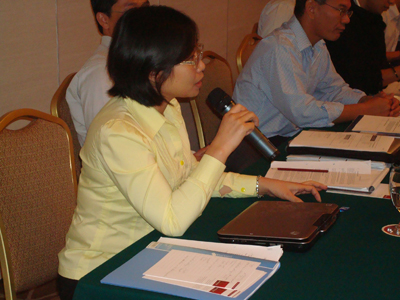 Nguyen Thi Hai
Yen, a lecturer from the Foreign Trade University at Hanoi complemented this, "the course is development-oriented and it firmly placed the development of developing countries in the core of its program. Various development issues
in the international economic agenda were covered and the experience of successful countries (Singapore, South Korea and others) was well integrated into the curriculum, making theories more understandable and realistic. We learnt
how diversified developing countries are from each other and why some countries have succeeded, while many others have not in their fight against poverty and underdevelopment. We also learnt about the many different paths available
to make progress particularly in development. For instance, the curricula included a real case study on Singapore - and we learnt what Singapore, once a low-income country, did to become such a success story. Nguyen Thi Hai
Yen, a lecturer from the Foreign Trade University at Hanoi complemented this, "the course is development-oriented and it firmly placed the development of developing countries in the core of its program. Various development issues
in the international economic agenda were covered and the experience of successful countries (Singapore, South Korea and others) was well integrated into the curriculum, making theories more understandable and realistic. We learnt
how diversified developing countries are from each other and why some countries have succeeded, while many others have not in their fight against poverty and underdevelopment. We also learnt about the many different paths available
to make progress particularly in development. For instance, the curricula included a real case study on Singapore - and we learnt what Singapore, once a low-income country, did to become such a success story. |
||
|
Yen was also complementary of the various policy development aspects that were integrated into the program and the experts who managed the debate sessions, working groups and team exercises. "The experts are really knowledgeable, skillful and committed. They did well in keeping in-class and outside-class debates and discussions going on in a relaxed and efficient manner. With their supervision, assistance and recommendations, we did a series of team work and made satisfactory presentations on various issues related to the six modules of the course. This helped us to improve our skills in preparing and making presentations, which is so important in demonstrating effectively what we had learnt." |
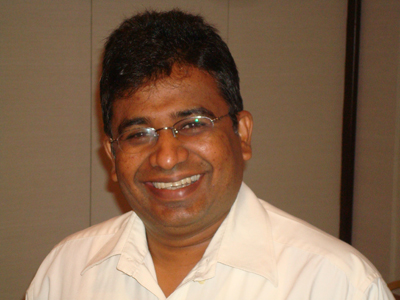 Sanjeewa
Pattiwila, Assistant Director of Commerce from Sri Lanka had this to add, "the program provided us with broader and deep knowledge on the main economics issues in the region. Most importantly it changed our way of thinking and exposed
new dimensions for us in understanding the important issues in economic development and to find sustainable solutions". Sanjeewa futher added, "the modules were well designed to cover all relevant issues related to development. The course
ended with the very interesting stimulation exercise which took us to the real situation of multilateral negotiations on trade in services. Listening to the presenters was always interesting and improved our knowledge". Sanjeewa
Pattiwila, Assistant Director of Commerce from Sri Lanka had this to add, "the program provided us with broader and deep knowledge on the main economics issues in the region. Most importantly it changed our way of thinking and exposed
new dimensions for us in understanding the important issues in economic development and to find sustainable solutions". Sanjeewa futher added, "the modules were well designed to cover all relevant issues related to development. The course
ended with the very interesting stimulation exercise which took us to the real situation of multilateral negotiations on trade in services. Listening to the presenters was always interesting and improved our knowledge". |
|
Ken had this to say, "we learnt from the experts as for me, this is the most important factor and corresponds to what we need as policy makers. The team exercises were very good as it enabled us to prepare policy recommendations in the case study that was presented in the class. But the simulation exercise on trade negotiations in trade in services was the best one. It is a real case study that reflected the reality of our work and one that looks at trade and development particularly in term of the trends of globalization." Anna agreed, "the modules were interlinked and built on the lessons and knowledge learned from the previous module. What we learned throughout the three weeks was put to the test and challenged in a simulation exercise on the last day." All four participants also complemented how they had learnt from each other and from other participants who had much to share in terms of their experience and knowledge. "The course allowed us to establish an important network amongst the participants. We learnt and understood from each other the importance of policy coordination, an issue that we face daily in our work", said Ken. Both Yen and Sanjeewa agreed, "We learnt a lot from the participants who made us feel strongly that all nations in the world, when they work hand in hand, can aim for a world free of poverty". Anna had this to say," it was a very interactive and intense and we were required to carry out research and submit short papers before the course. During the course, we had to carry out numerous activities in groups and present their findings to the rest of the participants. We learned the value of communication and coordination amongst ourselves in fulfilling the various activities that were required of us in each module. When the course ended, I had learned a lot more than what I had set out to achieve from the course." Sanjeewa added, "for me, it was the best training course I ever attended" and all four added that, "we have to thank UNCTAD, ESCAP and the Singapore Cooperation Program for that". |
| 22nd regional course, Medellin, Colombia 2011 |
| "The course left a definite mark as it was very thorough in the topics of the international trade agenda; it challenged the traditional paradigms that explained how some economies function and how they could be integrated globally" |
| Five participants from the 22nd regional course, have provided testimonies of their experiences at EAFIT University, Medellin, Colombia. |
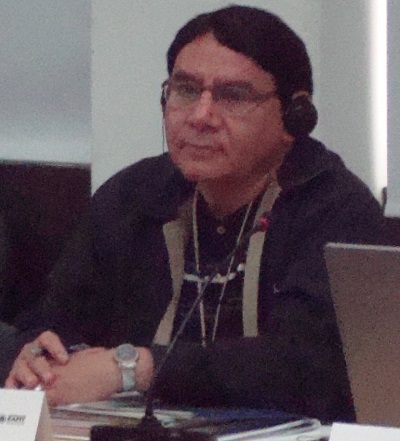 Roberto Corona Guzman from the Mexican Ministry of Economy commented that "the course gave a range of skills, presentations, including simulation exercises that were focused, interesting and held a critical view of international trade matters. The debates too had a focus on knowledge enhancement and were held in an environment of respect and friendly atmosphere. This course left a definite mark on me as it was very thorough in the topics of the international trade agenda and therefore very useful to my work office at the Ministry of Economy". Roberto Corona Guzman from the Mexican Ministry of Economy commented that "the course gave a range of skills, presentations, including simulation exercises that were focused, interesting and held a critical view of international trade matters. The debates too had a focus on knowledge enhancement and were held in an environment of respect and friendly atmosphere. This course left a definite mark on me as it was very thorough in the topics of the international trade agenda and therefore very useful to my work office at the Ministry of Economy".
|
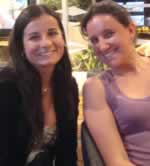 Rosa
Alvarez, Peruvian Ministry of Foreign Affairs said that "it was really useful to listen to different experiences of the countries in the region and especially different economic points of view. I now have a broader idea of development
and economic growth, the crisis and the macroeconomic policy responses, the role of investment and trade in development and the importance of science and technology to enhance the productive structure of countries that are rich in, and
exporters, of commodities". Rosa
Alvarez, Peruvian Ministry of Foreign Affairs said that "it was really useful to listen to different experiences of the countries in the region and especially different economic points of view. I now have a broader idea of development
and economic growth, the crisis and the macroeconomic policy responses, the role of investment and trade in development and the importance of science and technology to enhance the productive structure of countries that are rich in, and
exporters, of commodities". |
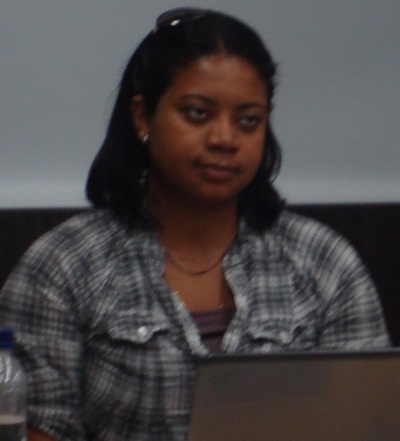 Rondine Twist, who works at the Belize Ministry of Foreign Affairs and Foreign Trade, agreed and felt that the experience was unique as the 3-week course covered a comprehensive range of topics with an underlying focus on growth and development of countries in the region. Rondine Twist, who works at the Belize Ministry of Foreign Affairs and Foreign Trade, agreed and felt that the experience was unique as the 3-week course covered a comprehensive range of topics with an underlying focus on growth and development of countries in the region.
|
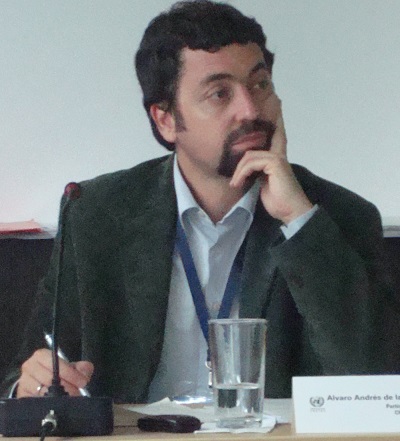 Alvaro de la Barra, an economist at the Studies Department, General Directorate of International Economic Relations in the Foreign Affairs Ministry in Chile, stated: "The course is very challenging and interesting as it addresses the most important issues on trade and investment policies for development, the macroeconomic policy framework in the context of globalization and the current perspectives of trade in goods and services in the context of WTO negotiations. I learnt new concepts and improved my knowledge in the context of policy making". Alvaro de la Barra, an economist at the Studies Department, General Directorate of International Economic Relations in the Foreign Affairs Ministry in Chile, stated: "The course is very challenging and interesting as it addresses the most important issues on trade and investment policies for development, the macroeconomic policy framework in the context of globalization and the current perspectives of trade in goods and services in the context of WTO negotiations. I learnt new concepts and improved my knowledge in the context of policy making". |
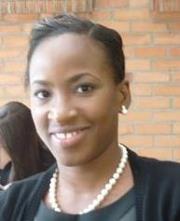 Finally, Tanya Henry, Foreign Service Officer from Jamaica, had this to say: "The course provided a useful focus on contemporary regional and international economic issues and how they have impacted the diverse economies of Latin America and the Caribbean. I have learned more about the role that government can play in setting cohesive, integrated and targeted policies that will help to achieve comprehensive development in the various sectors of an economy. The course also provided useful skills for analyzing the macroeconomic performance and policy making in the region and explored alternate viewpoints that sometimes challenged the traditional paradigms that have been used to explain how these economies function and how they could be integrated globally”. Finally, Tanya Henry, Foreign Service Officer from Jamaica, had this to say: "The course provided a useful focus on contemporary regional and international economic issues and how they have impacted the diverse economies of Latin America and the Caribbean. I have learned more about the role that government can play in setting cohesive, integrated and targeted policies that will help to achieve comprehensive development in the various sectors of an economy. The course also provided useful skills for analyzing the macroeconomic performance and policy making in the region and explored alternate viewpoints that sometimes challenged the traditional paradigms that have been used to explain how these economies function and how they could be integrated globally”. |
| All five of them also commented that the discussions and presentations were led by highly qualified UNCTAD and UNECLAC experts and Colombian practitioners in the relevant industries who shared information from various perspectives. "The interaction among 25 participants from 16 Latin American and Caribbean countries was always very dynamic; and we all learned a great deal about the differences, similarities, and various experiences of our respective countries. In both formal and informal settings I was able to gather a wealth of information; some general, and some very specific and targeted to my work", added Rondine Twist. |
|
All participants at the course made new contacts and now have access to an enlarged network of colleagues, professionals, and experts. Rondine confirmed that "my stay in Medellin was very pleasant and safe and the entire experience was wonderful and life enriching in so many ways; and I cannot think of any negative aspect of it. I highly recommend the course to others who may be interested." Roberto agreed: "Honestly, I hope that other Mexicans and colleagues from Latin America and Caribbean would have the opportunity to learn from this course. Almost immediately after its completion, we the participants now see the world with more critical eyes but also with a constructive and consistent view. For all these reasons I highly recommend this flag course of UNCTAD". Tanya went on to say, "I feel privileged to have been given this opportunity to participate in the programme and become part of the P166 network. I strongly encourage anyone with an interest in international and regional economies to become a part of this valuable, relevant and practical programme". |
| 21st Regional Course for Africa, Rabat 2012 |
| "National consultations and coordination are needed when discussing a country's policies or developmental goals" |
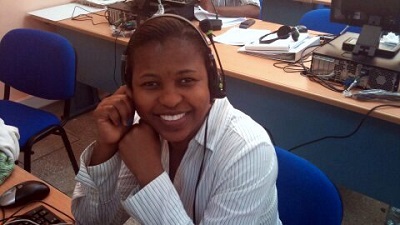 Khethiwe
Nkowazi Magagula from the Ministry of Commerce, Industry and Trade of Swaziland attended the 21st edition of the course for African policy makers. It was held at Rabat, Morocco in August-September 2012. For Khethiwe, the course was very
informative in terms of theory and excelled in taking issues of development to a practical level. "The course allowed us to understand the importance trade, investment and macroeconomic policies as they impact on development. I feel empowered
to better understand the key issues on the international economic agenda after attending this course". Khethiwe
Nkowazi Magagula from the Ministry of Commerce, Industry and Trade of Swaziland attended the 21st edition of the course for African policy makers. It was held at Rabat, Morocco in August-September 2012. For Khethiwe, the course was very
informative in terms of theory and excelled in taking issues of development to a practical level. "The course allowed us to understand the importance trade, investment and macroeconomic policies as they impact on development. I feel empowered
to better understand the key issues on the international economic agenda after attending this course". |
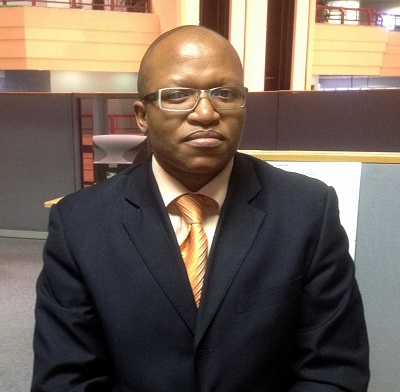 Bafoken
Noosi, economist at the Central Bank of Lesotho felt that the course was very intense and diverse, comprehensively covering a diverse range of macroeconomic, financial, investment and trade related issues with much emphasis being put on
development. I have a deep macroeconomic background but the course is structured in such a manner that it exposes the links across all these topics and how they complement each another. That made all participants to step out of their areas
of specialization and sparked their interest in all the other fields". Bafoken
Noosi, economist at the Central Bank of Lesotho felt that the course was very intense and diverse, comprehensively covering a diverse range of macroeconomic, financial, investment and trade related issues with much emphasis being put on
development. I have a deep macroeconomic background but the course is structured in such a manner that it exposes the links across all these topics and how they complement each another. That made all participants to step out of their areas
of specialization and sparked their interest in all the other fields". |
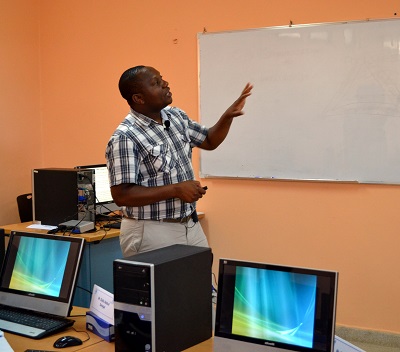 Cosmas
Masanja, Assistant Lecturer at the Business School, University of Dar-es-Salaam also added, "the course was good as all modules focused on getting solutions for challenges facing economic development in our countries". Cosmas
Masanja, Assistant Lecturer at the Business School, University of Dar-es-Salaam also added, "the course was good as all modules focused on getting solutions for challenges facing economic development in our countries". |
| All three felt that the simulation exercise on Services was very useful as it highlighted the importance of national consultations and coordination that are needed among relevant stakeholders to ensure that the schedule of specific commitments can be translated to exhibit a country's policies or developmental goals. Said Bafoken, "My favorite part of the course was the simulation exercise, especially the one on Services. At some point it was so real that I felt truly like the Minister of Finance advising the Prime Minister about economic policy and approaches to economic development in Sub-Saharan Africa. That was a "first" for me!" |
| What impressed these three participants, and many others, was the structure of the courses which engaged the participants through discussions and debates with UNCTAD experts. For Khethiwe this has created a network among the participants, experts in different fields such as trade, economics and investment, to continue in sharing best practices in an effort to promote development in the region. She also felt that their capacity was certainly build through the broader knowledge they acquired on how developing countries can achieve sustainable economic growth through the international trade agenda. For Cosmas it was so useful to learn about different approaches to imparting knowledge given the wide nature of the subjects. He was even impressed in the manner that some experts designed and packaged their power point presentations! Bafoken mentioned that he learnt approaches slightly different from the ones that was familiar with from the Bretton Woods institutions. |
| They also echoed the voices of many participants that the training was a success due to the diligence in the preparation of the curricula by UNCTAD experts. |
| The 21st regional course was originally scheduled to be held in January 2011 but due to events in Egypt, it was postponed and held in Rabat, Morocco in 2012. |
| 20th regional course, Beirut 2010 |
|
"It is a continuous, challenging and mind-stimulating course that takes your thinking to the next level" says Rami Al Hadid. |
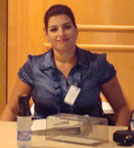 Manal
Yassine, a researcher at Lebanon's Ministry of Industry, attended the 20th UNCTAD Course on Key Issues on the International Economic Agenda held in Beirut in October 2010. She thought the course curricula introduced participants to an
up-to-date summary of the crucial issues that dictate the international economic agenda. The theoretical and the practical aspects were well designed to help participants deal with the different issues they encounter in their careers and
broadened their vision when having to solve economic problems related to trade, finance and investment. Manal also commented, "this UNCTAD course gave us the opportunity to communicate and to link up with different participants with diverse back grounds and experiences from several countries." Manal
Yassine, a researcher at Lebanon's Ministry of Industry, attended the 20th UNCTAD Course on Key Issues on the International Economic Agenda held in Beirut in October 2010. She thought the course curricula introduced participants to an
up-to-date summary of the crucial issues that dictate the international economic agenda. The theoretical and the practical aspects were well designed to help participants deal with the different issues they encounter in their careers and
broadened their vision when having to solve economic problems related to trade, finance and investment. Manal also commented, "this UNCTAD course gave us the opportunity to communicate and to link up with different participants with diverse back grounds and experiences from several countries." |
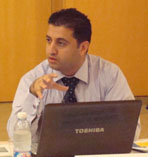 Rami
Al Hadid from the Central Bank of Jordan adds, "this UNCTAD course was different. The materials, presenters, participants, assignments and the organization were varied and produced an excellent curriculum that focused on international
trade and economic issues. For me, this course was very useful and new to me especially in the area of policy development. We worked in different groups to resolve issues in every module and then had to prepare our negotiating positions
either at the public level or beyond, at the WTO. The simulation exercise summed up the materials and knowledge acquired during the course which I think is unique to enhance negotiating skills. What distinguishes this course among others
is that it is a continuous, challenging and mind stimulating course that takes our thinking to the next level". Rami
Al Hadid from the Central Bank of Jordan adds, "this UNCTAD course was different. The materials, presenters, participants, assignments and the organization were varied and produced an excellent curriculum that focused on international
trade and economic issues. For me, this course was very useful and new to me especially in the area of policy development. We worked in different groups to resolve issues in every module and then had to prepare our negotiating positions
either at the public level or beyond, at the WTO. The simulation exercise summed up the materials and knowledge acquired during the course which I think is unique to enhance negotiating skills. What distinguishes this course among others
is that it is a continuous, challenging and mind stimulating course that takes our thinking to the next level". |
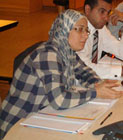 Hannadi Jaafar from the Ministry of Agriculture in Lebanon agrees. "The course was an occasion to communicate in different ways, to learn about various trade-finance-investment topics from experts who used substantive teaching tools (lectures, video and videoconference, stimulation exercises, face to face meetings, working sessions, etc.) which made the course interesting. The experts were very helpful, knowledgeable and open. Further the different background of participants provided an excellent forum for discussion during the course." Hannadi Jaafar from the Ministry of Agriculture in Lebanon agrees. "The course was an occasion to communicate in different ways, to learn about various trade-finance-investment topics from experts who used substantive teaching tools (lectures, video and videoconference, stimulation exercises, face to face meetings, working sessions, etc.) which made the course interesting. The experts were very helpful, knowledgeable and open. Further the different background of participants provided an excellent forum for discussion during the course." |
| 19th regional course, Baku 2010 |
| "Take full advantage of this UNCTAD course", Aygul Isayeva, Azerbaijan |
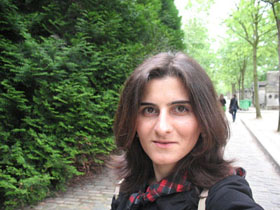 Aygul
Isayeva participated in the 19th Regional Course that was held in Baku. She said, "the course covered important issues such as trade, financial flows and macroeconomic policies in a globalizing economy; investment and enterprise development,
trade logistics and the role of ICT and finally WTO issues such as trade facilitation and the services negotiations. All in all it was a very good experience for me and increased my knowledge and understanding of these topics. I teach
at the Khazar University and definitely will have something to share with my students." Another participant, Olga Prosvirnina, Adviser on Services and Investment at the Russian Federation's Ministry of Economic Development also praised
the course. "I decided to participate as I wanted to learn more about these spheres. The course materials were useful and very well prepared which helped my study. My favorite sessions were the regional trade agreements and the GATS simulation
exercise that I thought was perfect. I like working in small groups as you organize brainstorming sessions and prepare your positions before participating in the negotiations". But that was not all; another assistant professor from the
St. Petersburg State University, Maraya Gubina also held similar views: "I improved my knowledge and will use the practical information and case studies with my students. It was great opportunity for ministry and academic staff to discuss
global economic trends and define how to improve a country's economic welfare." Aygul
Isayeva participated in the 19th Regional Course that was held in Baku. She said, "the course covered important issues such as trade, financial flows and macroeconomic policies in a globalizing economy; investment and enterprise development,
trade logistics and the role of ICT and finally WTO issues such as trade facilitation and the services negotiations. All in all it was a very good experience for me and increased my knowledge and understanding of these topics. I teach
at the Khazar University and definitely will have something to share with my students." Another participant, Olga Prosvirnina, Adviser on Services and Investment at the Russian Federation's Ministry of Economic Development also praised
the course. "I decided to participate as I wanted to learn more about these spheres. The course materials were useful and very well prepared which helped my study. My favorite sessions were the regional trade agreements and the GATS simulation
exercise that I thought was perfect. I like working in small groups as you organize brainstorming sessions and prepare your positions before participating in the negotiations". But that was not all; another assistant professor from the
St. Petersburg State University, Maraya Gubina also held similar views: "I improved my knowledge and will use the practical information and case studies with my students. It was great opportunity for ministry and academic staff to discuss
global economic trends and define how to improve a country's economic welfare." |
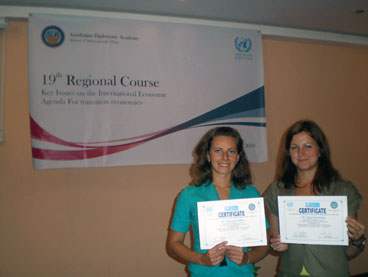 Aygul
agreed, "the simulation exercise on the GATS, the group exercises and case studies were very useful and practical. We were divided into groups and were given different roles. It was very challenging to make a decision as a policy maker,
to negotiate, to decide what needs to be done when your country encounters various problems and situations." All three participants also praised the high level of expertise from UNCTAD and UNECE presenters and the pedagogical methods used
in the course. One thing that Aygul, Olga and Maryana most enjoyed was not only discussing these views with these experts but also working with different participants from neighboring countries. Said Olga, "it was great to share experiences with other participants. It was especially interesting for me to listen to the positions and comments of other CIS countries and to learn how Russia's neighbors perceived the policies and decisions of our Government. I learnt a lot and tried to clarify some problematic issues". For Aygul, it was clear that the course curricula and objectives matched her expectations. "I wish UNCTAD the best of luck for the next regional courses and I advise future participants to try to take full advantage of it." Aygul
agreed, "the simulation exercise on the GATS, the group exercises and case studies were very useful and practical. We were divided into groups and were given different roles. It was very challenging to make a decision as a policy maker,
to negotiate, to decide what needs to be done when your country encounters various problems and situations." All three participants also praised the high level of expertise from UNCTAD and UNECE presenters and the pedagogical methods used
in the course. One thing that Aygul, Olga and Maryana most enjoyed was not only discussing these views with these experts but also working with different participants from neighboring countries. Said Olga, "it was great to share experiences with other participants. It was especially interesting for me to listen to the positions and comments of other CIS countries and to learn how Russia's neighbors perceived the policies and decisions of our Government. I learnt a lot and tried to clarify some problematic issues". For Aygul, it was clear that the course curricula and objectives matched her expectations. "I wish UNCTAD the best of luck for the next regional courses and I advise future participants to try to take full advantage of it." |
| 18th regional course, Mrutyunjay Behera, India 2009 |
| "The best course I ever attended", Mrutyunjay Behera, India |
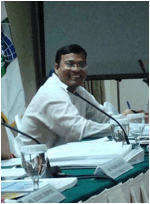 The
18
th Regional Course on the key issues on the International Economic Agenda organized by UNCTAD in cooperation with the Non-Aligned Movement Centre for South-south Technical Cooperation in Jakarta is the best course on international
economic issues that I have ever attended. It encompassed all the key issues which the international communities are grappling with and systematically designed that all the modules were well interwoven. The course gave
us a deeper understanding of external shocks like the current financial crisis and the necessity for financial stability. It also discussed the continuous need of FDI and their linkages with SMEs and also discussed the role of infrastructure
like transportation for development of an economy, and the role of technology in economic development, etc. The program enlightened me and other participants on these issues. The debate sessions at the end of the day helped us to
understand the issues better. Not only that, it also developed an esprit de corps amongst the participants. Last but not least the simulation exercise on a WTO trade provision left with us an imprint of a negotiator with
real skills. The
18
th Regional Course on the key issues on the International Economic Agenda organized by UNCTAD in cooperation with the Non-Aligned Movement Centre for South-south Technical Cooperation in Jakarta is the best course on international
economic issues that I have ever attended. It encompassed all the key issues which the international communities are grappling with and systematically designed that all the modules were well interwoven. The course gave
us a deeper understanding of external shocks like the current financial crisis and the necessity for financial stability. It also discussed the continuous need of FDI and their linkages with SMEs and also discussed the role of infrastructure
like transportation for development of an economy, and the role of technology in economic development, etc. The program enlightened me and other participants on these issues. The debate sessions at the end of the day helped us to
understand the issues better. Not only that, it also developed an esprit de corps amongst the participants. Last but not least the simulation exercise on a WTO trade provision left with us an imprint of a negotiator with
real skills.I am responsible for investment promotion and international cooperation including trade and finance related policies, the environment, and the implementation of trade facilitation measures for the development of my country. The curriculum was designed in such a way that it helped me to understand better, design and implement those policies for a smooth flow of trade, investment and finance. It also provided a deeper insight of the areas I am dealing with and this has contributed to enhance my professional and personal development. The presenters were the specialists in their own field and they were skillful in their dialogue and presentations in such a way that the knowledge was useful and relevant for the trainees. Mrutyunjay Behera is Deputy Director at the Department of Industrial Policy and Promotion, Ministry of Commerce and Industry, Government of India |
| 17th regional course, Cairo 2009 |
| Sebenzile Dlamini from Swaziland praises world class delivery of regional program in Cairo 2009 |
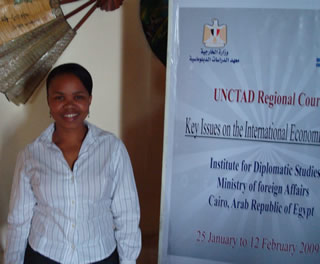 The
course empowered me with practical knowledge on the ramifications of multilateral trade agreements and how developing countries can increase their stake in the global economy by implementing a coherent and economically sound set of policies
covering: resources; foreign and national investment; science, technology and innovation; transport, trade facilitation and trade agreements. The simulation exercise on trade negotiations was particularly useful in imparting coordination
and organisational skills for national consultations and capacity to negotiate with developed countries at the multilateral and regional trade fora. The
course empowered me with practical knowledge on the ramifications of multilateral trade agreements and how developing countries can increase their stake in the global economy by implementing a coherent and economically sound set of policies
covering: resources; foreign and national investment; science, technology and innovation; transport, trade facilitation and trade agreements. The simulation exercise on trade negotiations was particularly useful in imparting coordination
and organisational skills for national consultations and capacity to negotiate with developed countries at the multilateral and regional trade fora. |
| I was highly motivated by the world-class delivery of the training by the experts. They demonstrated an exceptional command in participatory teaching which created a conducive atmosphere for participants to make up their own minds about policy options that could be implemented in their countries. The experts also provided an indirect mentorship role as I have personally developed in terms of presentation skills, team work and leadership capability. One cannot be thankful enough to UNCTAD for the training that also exhibited efficiency in time management and overall logistics. |
| 15th regional course, Bahrain 2008 |
| Mohamed Hamza Ibrahim from Egypt participate in the delivery of regional program in Bahrain 2008 |
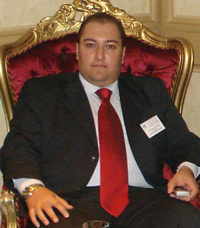 Mohamed Hamza Ibrahim,
an International Trade Policies Researcher from the Central Department of World Trade Organization at the Ministry of Trade and Industry of Egypt attended the P166 regional course in Bahrain 2008. The following are his impressions of the
program, his participation and his thoughts on the usefulness and relevance of the program. I was one of the 19 participants that participated at the 15th regional course held in the Kingdom of Bahrain. I am here to share my experience
with you to encourage people from different sectors in both developing and LDCs to take part in this course. It is important here to mention that selection for this course is pretty tough as there is a high demand by Governments for this
course. When I received the content of the training program and saw the intensity and importance of the topics to be covered, I had two thoughts; the first was that it would be impossible to cover all the issues in just three weeks and that the final outcome for the participants will not be significant. The second, however, was very different and I thought that this is an important course. In Bahrain, three days later into the program, I realized that I was very lucky for having being chosen. Mohamed Hamza Ibrahim,
an International Trade Policies Researcher from the Central Department of World Trade Organization at the Ministry of Trade and Industry of Egypt attended the P166 regional course in Bahrain 2008. The following are his impressions of the
program, his participation and his thoughts on the usefulness and relevance of the program. I was one of the 19 participants that participated at the 15th regional course held in the Kingdom of Bahrain. I am here to share my experience
with you to encourage people from different sectors in both developing and LDCs to take part in this course. It is important here to mention that selection for this course is pretty tough as there is a high demand by Governments for this
course. When I received the content of the training program and saw the intensity and importance of the topics to be covered, I had two thoughts; the first was that it would be impossible to cover all the issues in just three weeks and that the final outcome for the participants will not be significant. The second, however, was very different and I thought that this is an important course. In Bahrain, three days later into the program, I realized that I was very lucky for having being chosen. |
|
|
I have gained a lot, as a member of the department that handles Egypt's position at WTO negotiations. I learnt new concepts that will help me have a wider view for these negotiations and to link the current economic situation of my country with these negotiations. For instance, the role of FDIs and SMEs in Egypt's economy is essential and therefore in WTO negotiations it is my role to support and form policies that will encourage more FDIs into my country. Further, I am very interested now to learn about the difficulties faced by SMEs in Egypt and to understand how WTO negotiations can encourage and protect this sector. I will needs days to discuss how beneficial this course was, but I encourage everyone to try and join this training program because at the end you will learn new issues and concepts that can be added to your knowledge and which will help to improve your understanding of different economic issues in today's world. Finally, I should thank the head of my department (CD/WTO) for selecting me to participate in this course. I also thank UNCTAD for the professional organization of this program and also to the Kingdom of Bahrain for hosting this activity. Finally I need to thank my colleagues from different Arab countries that participated in this course for the spirit of friendship and brotherhood that I have felt throughout the course. |
|
| 14th regional course, Belarus 2008 |
|
Associate Professor at Belarus State Economic University praises UNCTAD's regional course |
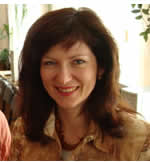 Alena
Petrushkevich, Associate Professor and Vi coordinator at Belarus State Economic University wrote she was proud that her University was chosen to host UNCTAD's 14th regional training course on Key Issues of the International Economic Agenda.Twenty
four participants from 12 countries in Eastern Europe and the Commonwealth of Independent States (CIS) attended the course held June 23-July 11. Alena
Petrushkevich, Associate Professor and Vi coordinator at Belarus State Economic University wrote she was proud that her University was chosen to host UNCTAD's 14th regional training course on Key Issues of the International Economic Agenda.Twenty
four participants from 12 countries in Eastern Europe and the Commonwealth of Independent States (CIS) attended the course held June 23-July 11.Petrushkevich reports that the program examined contemporary topics on international economics and their development implications for economies in transition. The course was organized in a systematic manner which, in spite of the wide range of topics, dealt effectively with policies relevant for the region in a globalizing economy, giving policy-makers the overall picture of trends in international economic development to help them define the right policies for their region. |
|
"The course exceeded my expectations," Petrushkevich said. "It focused not just on presenting information and theory but on generating debates, brainstorming and presentations from participants. This is an essential advantage of the course that distinguishes it from many others." There were a lot of examples from international practice, supported by facts and statistical evidence. UNCTAD experts used active methods of training and communication that generated lively discussions often extending through coffee and lunch breaks, she adds. "The simulation exercise on GATS was unique. It synthesized the concepts learned in the training modules and provided opportunities to learn about WTO rules and to acquire negotiating skills. "In my opinion, the level of the course was very high and the participants are lucky to have had an opportunity to gain from it," she concludes. |
| 13th regional course, Belgrade, Serbia 2006 |
| Belgrade course draws to a close: Two participants share their impressions |
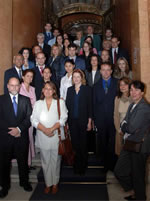 Sixteen
participants from nine countries in Eastern Europe gathered in Belgrade, Serbia for the Second Regional Training Course on Key Issues on the International Economic Agenda. The three-week course was organized into five modules dealing with
issues particularly important to the region: trade, financial flows, macroeconomic policies and development in a globalizing economy; key policy issues of the information economy; investment and enterprise development; transport logistics
and trade facilitation measures at the WTO and international trade and development. "The different subjects were presented by very good professionals, with great knowledge in the relevant fields. We had the possibility to discuss the different
subjects and to compare our countries' experiences," said Venislava Dacheva, from the Ministry of Economy and Energy of Bulgaria. "The information provided was based on their own experience and research projects of UNCTAD. The unique cases
in international economy ... strengthen my arguments when I talk to government officials or students," says Kiryl Rudy, Associate Dean at Belarus State Economic University. "The authorities looked at the problems again, even if it seemed
that everything was already said and done. I can teach my students to think with the help of those problems." Ms. Dacheva adds, "the simulation exercise held at the end of the training made effective use of the knowledge acquired during
the course. It was a challenge to put the participants in different roles, to experience balancing the different interests and concerns." "We were all divided into groups, and some friends became competitors in order to achieve their own
goals," said Mr. Rudy. "I've adopted a similar game with my students. Sixteen
participants from nine countries in Eastern Europe gathered in Belgrade, Serbia for the Second Regional Training Course on Key Issues on the International Economic Agenda. The three-week course was organized into five modules dealing with
issues particularly important to the region: trade, financial flows, macroeconomic policies and development in a globalizing economy; key policy issues of the information economy; investment and enterprise development; transport logistics
and trade facilitation measures at the WTO and international trade and development. "The different subjects were presented by very good professionals, with great knowledge in the relevant fields. We had the possibility to discuss the different
subjects and to compare our countries' experiences," said Venislava Dacheva, from the Ministry of Economy and Energy of Bulgaria. "The information provided was based on their own experience and research projects of UNCTAD. The unique cases
in international economy ... strengthen my arguments when I talk to government officials or students," says Kiryl Rudy, Associate Dean at Belarus State Economic University. "The authorities looked at the problems again, even if it seemed
that everything was already said and done. I can teach my students to think with the help of those problems." Ms. Dacheva adds, "the simulation exercise held at the end of the training made effective use of the knowledge acquired during
the course. It was a challenge to put the participants in different roles, to experience balancing the different interests and concerns." "We were all divided into groups, and some friends became competitors in order to achieve their own
goals," said Mr. Rudy. "I've adopted a similar game with my students. |
| "Holding the seminar in Serbia, the country of former Yugoslavia, reminded me of the early 1990s and the beginning of the transition process in our countries. We faced similar problems. Some of them were solved, and we are still working on others. We compared, discussed, wondered, recommended, agreed and denied on similar issues facing transition economies." |

